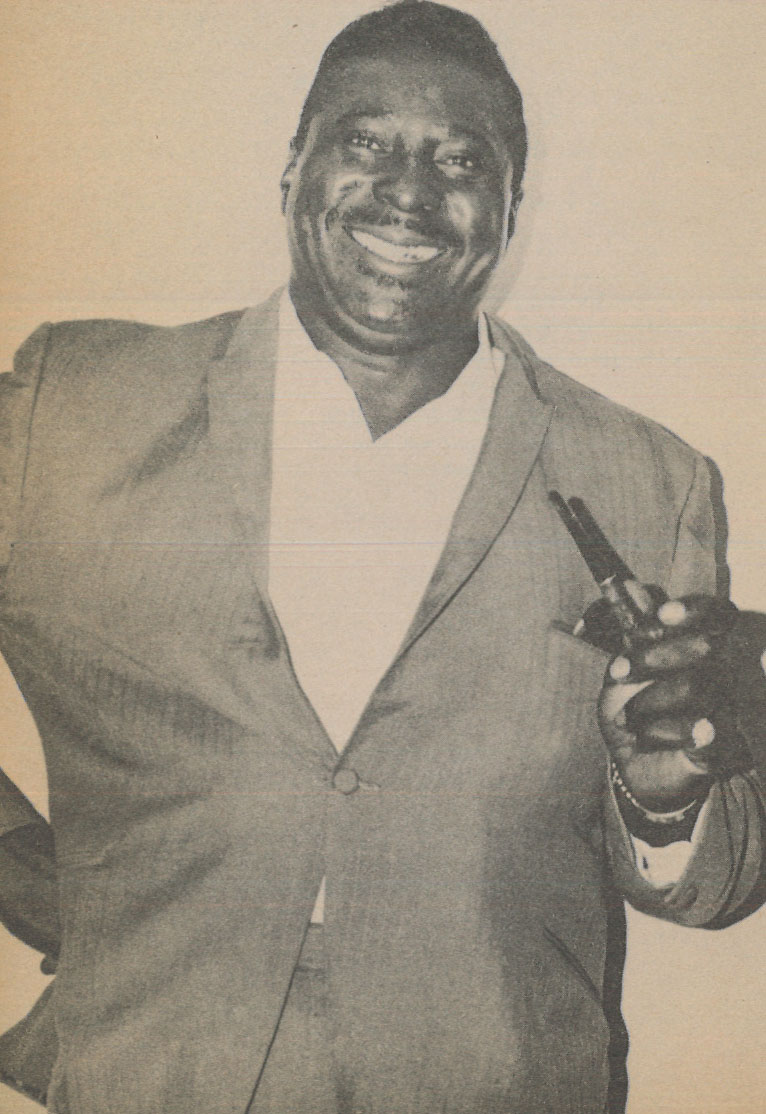
ALBERT KING
HOMETOWN: Osceola, Arkansas
MAILING ADDRESS: Stax Records, Inc., 98 North Avalon, Memphis, Tennessee
38104
MUSIC SPECIALTY: Blues guitarist/singer
ALL about Albert . . .
Albert King was so poor when he started he had to make the first guitar he
ever owned: "I took the wire from around a whisk broom-the wire that
holds the straw together-burned some holes in a piece of wood, and strung it
up. But as soon as I could afford it, I bought a guitar and got good enough
to play here in some Osceola clubs. I was working days driving a
bulldozer."
Everyone has some explanation for the popularity of blues shouter Albert
King. They stress things like his concern with social problems or the way his
washday blues, broken hearts and lost-hope songs reach today's youth.
But the truth of the matter is really very simple -- Albert King's music is
just like Albert King. Strong and honest. "I don't play like nobody
else," the sensational guitarist says. "I don't try to either. You
can't fool these kids!"
Leaving his bulldozer behind, Albert picked up his guitar and went to St.
Louis to pay his dues in "road joints" for five dollars a night
"and all the flying bottles I could duck!"
After twenty-three years of road joints, King finally found fame when rock
impresario Bill Graham (ex-manager of the Fillmore West in San Francisco) put
him on his Fillmore stage. Guitar in hand, Albert played and sang in his own
black primitive style and the kids went wild!
From New York to Europe, they've been going wild ever since! Success.
Acclaim. Money. But essentially he's the same old Albert King.
"No, man," he says a bit wearily, "you're not gonna forget
that I was twenty-three years in those road joints. Or that I was five years
on that bulldozer, or that I can remember Mama riding a bus and then walking
two miles from the bus stations to sing all night for two dollars. You don't
think I'm gonna forget that-do you?"
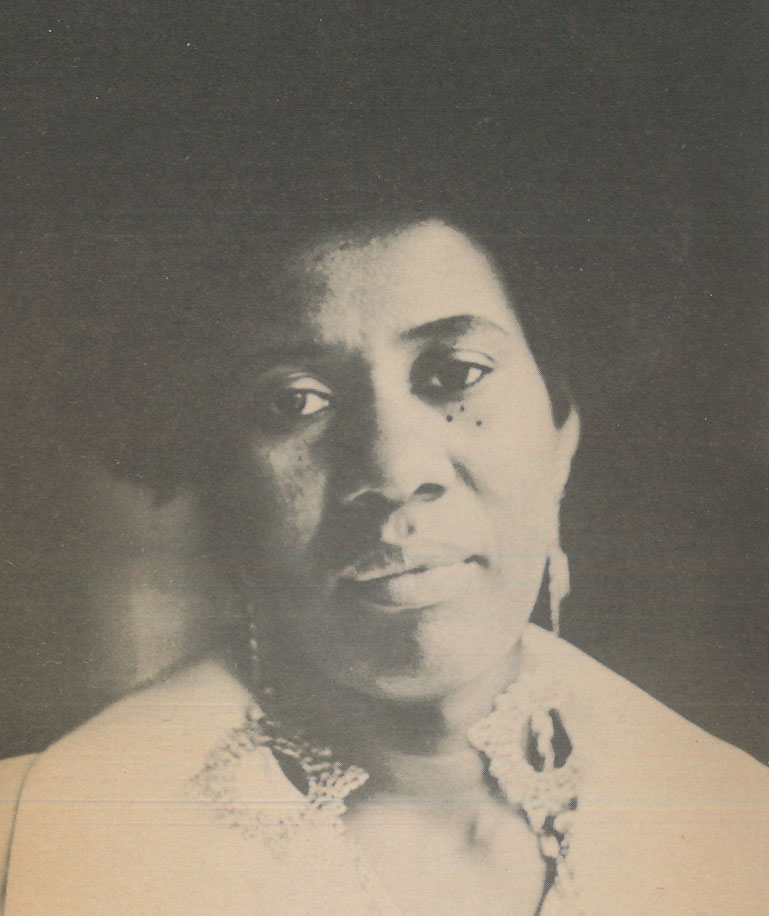
ALICE COLTRANE
HOMETOWN: New York, New York
MUSIC SPECIALTY: Piano
BIGGEST HITS: "Africa/Brass," "Ascension," "Kula Se
Mama"
ALL about Alice . . .
Born on August 27, 1937, Alice McLeod Coltrane came from a musical
background. Her brother, Ernie Farrow, is a bassist and her mother played
piano and sang in the church choir.
Alice studied music at the age of seven, finally taking private lessons in
theory, harmony and organ. Alice Coltrane became a professional pianist.
She went to Europe and studied under Bud Powell in 1959. When she returned,
Alice performed with such greats as Lucky Thompson, Johnny Griffin. Kenny
Burrell, and she traveled on the road for a year with Terry Gibbs.
Then Alice met and married John Coltrane and replaced McCoy Tyner as John's
pianist. Together they produced three sons, John Jr., Ravi and Oranyan, plus
an understanding which allowed the great artistry of John to continue long
after he was gone.
John died in 1967, leaving a reputation of respect and a spiritual feeling in
Alice to continue his belief in music. John taught Alice to use the piano as
an extension of her feelings. Today she is still dedicated to exploring every
aspect of her late husband's music and religion. As she herself says,
"Everything I do is an offering to God that's the truth."
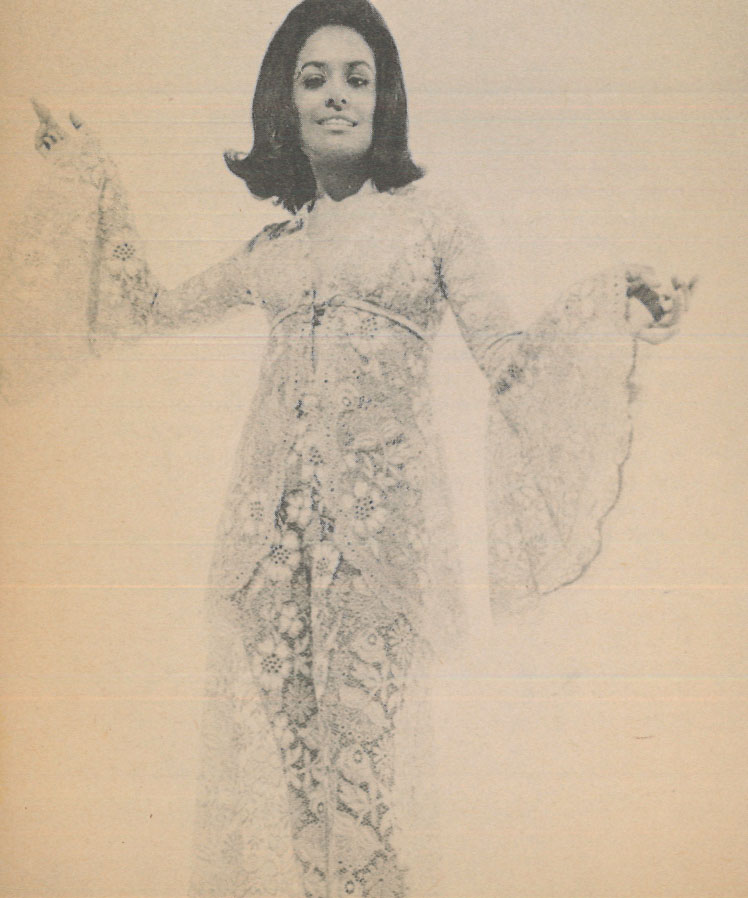
BARBARA MCNAIR
HOMETOWN: Bay City, San Francisco, California
MUSIC SPECIALTY: Pop singer
BIGGEST HITS: Songs from No Strings, Guys and Dolls, Wild Is the Wind and her
own Barbara McNair Show
ALL about Barbara . . .
Born in Chicago and educated in Racine, Wisconsin, multi-talented Barbara
McNair was headed for stardom long before she knew it. But her mother did!
A housekeeper at a children's institute, Barbara's mother encouraged her to
enter musical talent contests in Racine. When Barbara began winning
everything she entered, her mother decided she should concentrate on music in
high school. After graduation, Barbara continued her musical studies at the
University of California in Los Angeles-but not for long.
After a year, she decided that what she really needed was experience, not
theory. So she moved to New York.
When she wasn't making the rounds at nightclubs.
Barbara used her high school training to get a daytime secretarial job. In
the evenings she sang for free, wherever she could, until Max Gordon heard
her and offered her a job at his famous Village Vanguard. Things didn't go
the way she expected, and soon Barbara was back singing at parties. On the
verge of giving up the idea of a music career. Barbara met an agent who
pointed her to Arthur Godfrey. She was an immediate success on The Arthur
Godfrey Show and her career was, at last, launched.
Today the incredibly busy actress-singer (some of her film appearances
include The Organization, If He Hollers, Let Him Go!, They Call Me Mr. Tibbs,
Venus in Furs, Stiletto and Change of Habit) lives with her husband, nightclub
owner Jack Rafferty, in San Francisco-that is, when she's not touring the
country's top nightclub acts, making movies, guesting on television or
recording albums!
After taking over Diahann Carroll's lead role in Richard Rodger's No Strings
Broadway musical in 1962. Barbara returned home to find herself a star in
demand! Television offers poured in. Her hard work with Nat "King"
Cole (she once was a member of his company) had indeed paid off. Appearing
with "King" in Wild Is the Wind brought her the national acclaim
she needed-and the lead in No Strings.
After that things only got better.
Establishing herself on television with her own show, The Barbara McNair
Show, it was just a matter of time until her movie debut. Soon after, she
appeared in the film Change of Habit and her co-star was Elvis Presley. Her
first co-starring role with her favorite actor, Sidney Poitier, was They Call
Me Mr. Tibbs. Most recently she again teamed with Poitier in The
Organization. Standing 5'3", Barbara weighs all of 115 pounds, but her
"face, of classic beauty" makes her an undisputed giant in the
"world of beautiful women."'
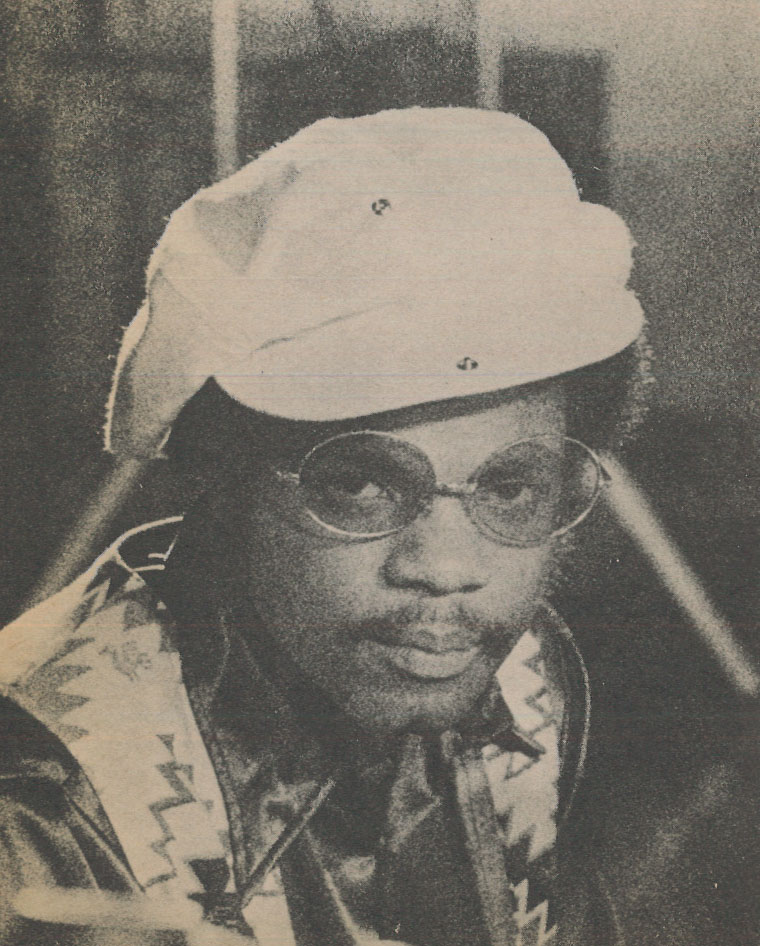
BILLY PRESTON
HOMETOWN: Houston, Texas
MUSIC SPECIALTY: Rhythm and blues pianist, composer and vocalist
BIGGEST HIT: "That's The Way God Planned It"
ALL about Billy . . .
Billy Preston, among several hundred other important things, has the
distinction of being the first black man to record with the Beatles. He also
has two solo albums under the producership of George Harrison. When he
rocked, rolled and shouted out "That's The Way God Planned It,"
rock history was being made. The back-up band just happened to be Ringo Starr,
George Harrison, Leon Russell and Eric Clapton. And the occasion was Billy's
appearance, along with such other guest stars as Bob Dylan, at the Madison
Square Garden's benefit concert for East Pakistani refugees.
A respected keyboard artist, composer and vocalist, Billy's back-up work can
be heard on the albums of Carole King, Barbra Streisand, the Beatles (he also
appeared in their film Let It Be), Merry Clayton, Ray Charles and Aretha
Franklin.
Born September 9, 1946, in Texas, Billy was raised in Los Angeles. At three
he started the piano, due primarily to his mother's encouragement. (His
mother, by the way, once played "Sapphire" on The Amos 'n' Andy
Show). By the time he was ten, Billy was appearing locally with the Mahalia
Jackson Show until a film producer spotted him for the child's role of
"Handy" in St. Louis Blues which starred Nat King Cole.
In 1962 Billy was touring England with Little Richard and Sam Cooke. "Up
until then," Billy says, "I'd been doing only gospel music. Richard
thought it was to be a gospel tour, but everyone wanted that 'good ol' rock
'n' roll' and we gave it to 'em!" From England they went to Germany, and
in Hamburg, the 1962 scene for aspiring groups, Billy met the Beatles. They
were nobody then.
"They would dedicate 'A Taste Of Honey' and 'Love Me Do' to me, because
they were my favorite numbers.
George once asked me to join them on stage, but I had to say no."
As the years went by, Billy continued touring with superstars -- he even had
a solo spot on the Ray Charles Show, and Charles used to introduce him like
this: "I'd like to introduce to you Billy Preston. He's the young man
that if I leave this business I want to take over what I started!"
Today Billy records for A&M. And as for any future plans, he gives his
answer in poetry: ". . . I will never give up the thought/ determination
can win./ I must pay my dues, bide my time/ it's just around the bend . .
."
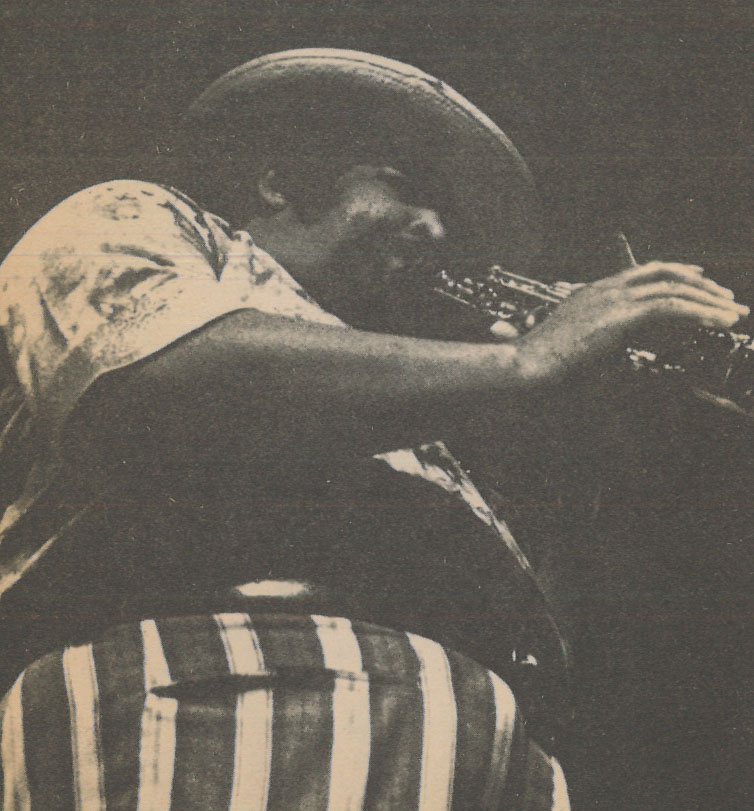
CANNONBALL ADDERLEY
HOMETOWN: Tampa, Florida
MUSIC SPECIALTY: Tenor saxophone
BIGGEST HITS: "This Here," "Dat Dere," "Work
Song," "Sack O' Woe"
ALL about Cannonball . . .
Born Julian Adderley, Cannonball picked up his nickname because he ate like a
"cannibal."
After attending Tallahassee High School where he played both brass and reed
instruments, Cannonball became band leader at Dillard High School in Fort
Lauderdale in 1948 and formed his first jazz group. Then in the early fifties,
he went into the Army and became the leader of the 36th Army Dance Band while
studying at the U.S. Naval School of Music in Washington, D.C.
In 1956 Cannonball went to N.Y.C. to hear his friend, trombonist Jimmy
Cleveland, perform at the Cafe Bohemia. He had brought his horn along and was
asked to sit in. Jokingly the group started into a double-time number to
throw him off. But Cannonball not only kept up, he added a fantastic solo of
his own. A few weeks later, he was signed by EmArcy Records.
Since then, Cannonball has formed numerous groups (mostly quintets), played
with such greats as Miles Davis and John Coltrane, and done well on his own.
Cannonball was largely responsible for "establishing reeds/
trumpet/rhythm quintets as the most viable of post bop ensemble forms"
and helped define "soul jazz" which was so popular in the late
fifties and early sixties.
Being open to new sounds and caring for every musician he has come in contact
with are Cannonball's two greatest assets. In the fifteen years of his
career, he has been learning and changing, experimenting and developing. Yet
always there is, at the base of his music, a deep attachment to the blues and
to the music forms that have grown from it. When Cannonball plays, no one
remains untouched.
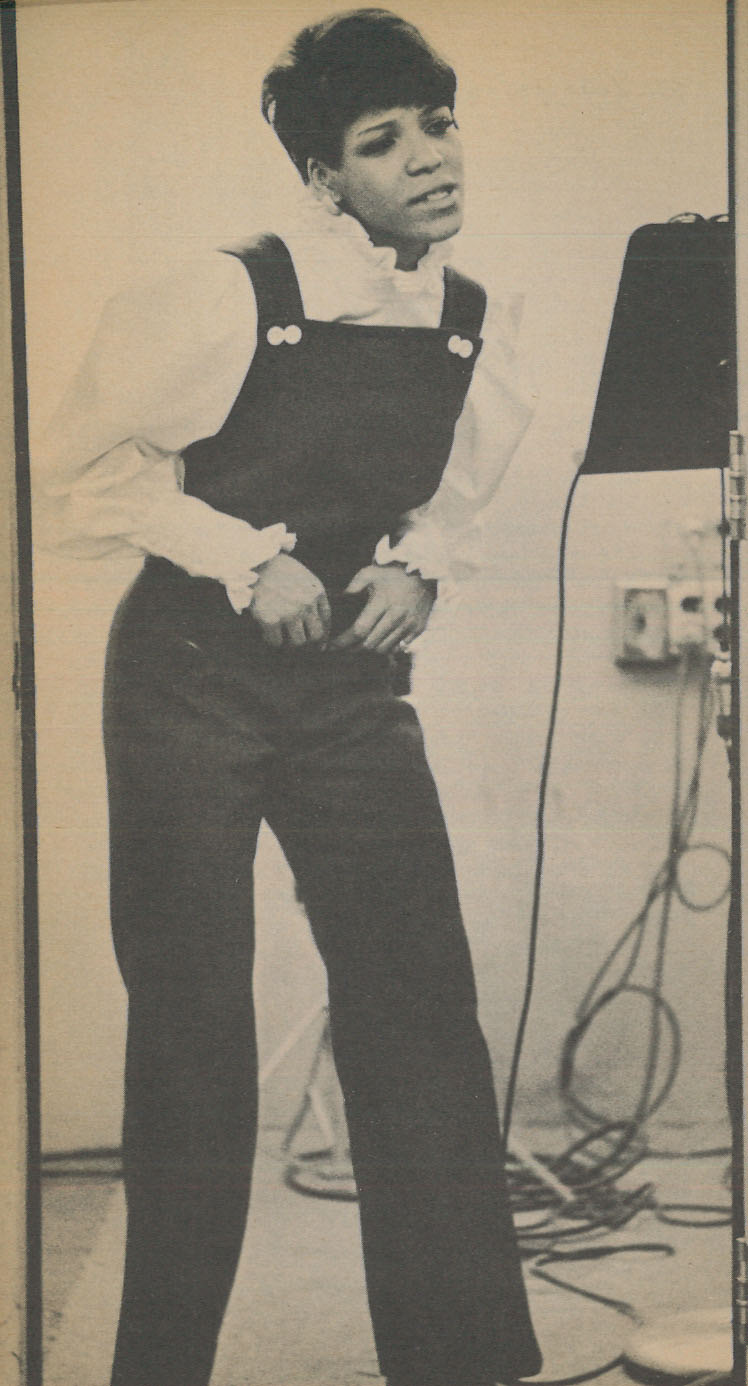
CAROLYN FRANKLIN
HOMETOWN: Memphis, Tennessee
MUSIC SPECIALTY: Singer/writer
BIGGEST HITS: "Ain't No Way," "Baby, Baby, Baby,"
"Save Me"
ALL about Carolyn . . .
Yes, of course she's Aretha's sister -- but that's not all there is to
Carolyn Franklin! As a matter of fact, Aretha might tell you that Carolyn is
a lot of what there is to Aretha Franklin!
Beginning her musical career as a back-up voice (along with sister Erma
Franklin) on Aretha's records and concert tours, Carolyn deserves much of the
credit for Aretha's hits. Not only the leader of Aretha's vocal trio, Carolyn
also wrote some of her famous sister's biggest hits including: "Baby,
Baby, Baby" and "Ain't No Way." She was also the composer of
sister Erma's hit "Don't Wait Too Long."
After graduating from Case Tech in Detroit and taking time out for writing
courses at the University of Southern California. Carolyn decided there was
no point in fighting the inclination to follow her famous family into the
world of music. Though she'd been singing in church functions since she was a
baby, actually taking the big step into a solo career was a hard thing to do.
To the youngest member of the family (she's twenty-five today), it all seemed
so overwhelming.
Fortunately, talent tells the final tale, and both as a singer and
songwriter, Carolyn Franklin is a star first and Aretha's sister second.
Today she makes her home in Detroit, "playing at the piano and
clarinet" and writing things down whenever the songwriting bug hits her.
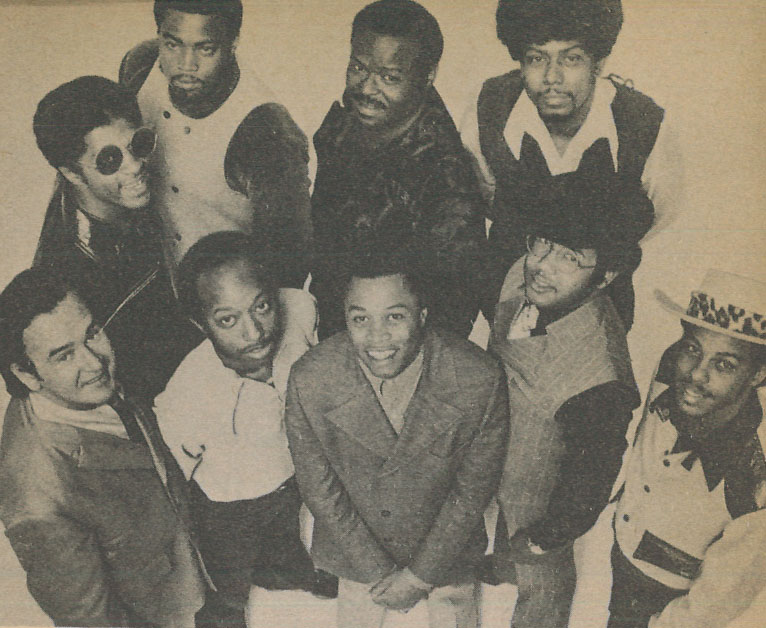
CHARLES WRIGHT AND THE WATTS 103RD STREET RHYTHM BAND
HOMETOWN: Watts, California
MUSIC SPECIALTY: Eight-man rhythm and blues band (guitar, piano, trumpet,
drums, trombone, tenor sax, xylophone)
BIGGEST HITS: "Do Your Thing," "You're So Beautiful"
ALL about Charles Wright and the Watts 103rd Street Rhythm Band . . .
"I supposed we could go totally commercial, turn out more rock music or
do other people's styles," says Charles Wright, leader of the Watts
103rd Street Rhythm Band and one-time singer/producer of such
oldies-but-goodies as "You Cheated, You Lied, (You Said That You Loved
Me)."
"But that would be like stealing," he continues. "Almost all
the good commercial music out now has its roots in blues and rhythm 'n' blues
-- black music! So why should we do variations of our own music when we've
got the original right here?"
Once called Charles Wright and the Wright Sounds, the Watts Band took friend
Bill Cosby's suggestion and became the 103rd Street Rhythm Band, simply
because that's where they all lived!
Today they've been together over three years, and that -- by their own
admission -- is no easy feat! As it stands, they've only lost one member --
and he was never replaced.
Obviously, this is no ordinary group.
"Funny thing is," Charles says, "any other R&B group would
have given up before we did. See, in R&B, if you don't get steady hits,
everything goes down the tubes. We managed to stay together until we got it
started."
Besides being the leader, Charles also contributes most of the material to
his group's repertoire, produces all their sessions, and keeps everyone's
morale up where it has to be in order to stay with success.
In addition to Charles (who plays piano and guitar), the Watt's Band brags of
Gabriel Flemings (trumpet), Al McKay (guitar and drums), Ray Jackson
(trombone), John Rayford (tenor sax), Melvin Dunlap (electric steel guitar,
xylophone), Bill Cannon (tenor sax), and James Gadson (drums).
All very different human beings, the group has one important meeting ground:
their goal to make rhythm and blues music as important to the rest of the
world as it is to them.
"What I want to do," says trombone player Ray Jackson (also the
arranger on many of the Watt's Band's songs), "is raise R&B to its
highest musical and cultural level, put it on a level with classical
music."
John Rayford agrees: "Music today is going back to a feeling it used to
have. We mix blues and jazz, trying to get our own sound. It's hard to put
what we're doing into words -- it's just something we hear!"
"We all think alike musically," Melvin Dunlaps adds. "There
are a lot of us, a lot of different personalities -- but musically, we're the
same. That explains the way we play."
"Without unity, we'd have chaos!" Bill Cannon insists. "We
have to evolve slowly into a free-form group, and still make it good enough
for us to enjoy as musicians. Right now we're still playing with form.
Eventually we want to free ourselves of form as a unit."
"When we recorded 'Do Your Thing,' Charles says proudly, "we did it
live in a club. We'd never played the song before. We just jammed it and I
came up with words on the spot. Then when we heard the tape, nobody had any
faith in it -- except my drummer. James Gadson, and myself. But I decided to
release it anyway. My best friend called me up and told me I should be
ashamed of myself for releasing an unfinished product. But that record made
it!"
And so did Charles and the Watts 103rd Street Rhythm Band! Appearing all over
the country with stars like Diana Ross, the Supremes, Nina Simone, Marvin
Gaye, Bill Cosby and Dionne Warwicke -- the Watts Band is no
"here-today-gone-tomorrow" act.
"Right now a lot of our message is in the music," Charles says.
"But I have a few songs we haven't recorded yet that I want to change.
I've got a lot to say, and I want to make sure everyone understands when I
say it! No matter how good a product may be, if it's phony, people know it.
Our music is honest. The feeling's there. It says what it means."
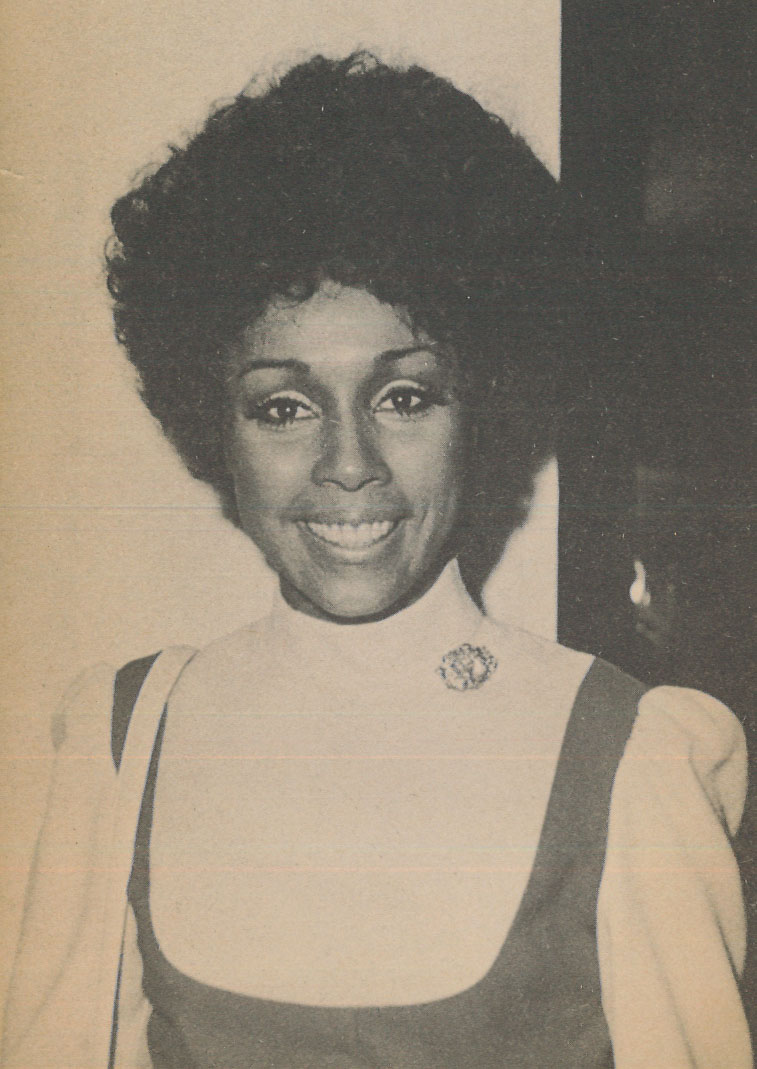
DIAHANN CARROLL
HOMETOWN: Bronx, New York
MUSIC SPECIALTY: Vocalist
BIGGEST HIT: Porgy and Bess
ALL about Diahann . . .
Striking Diahann Carroll is famous for Broadway musicals, motion pictures,
television and a beautiful singing voice.
Diahann, born in the Bronx, won a Metropolitan Opera scholarship at the age
of ten, which led to the High School of Music and Art. Not sure of what she
wanted to do with music, she enrolled in sociology at New York University.
But music was in her blood. She auditioned for a jazz revue put together by
showman Lou Walters which never happened. But the impression she left with
Lou led to an appearance on the show Chance of a Lifetime. She won for three
weeks straight. This, in turn, led to a week's engagement at New York's Latin
Quarter, an engagement that was held over for four weeks.
Keeping her philosophy that "Love is everything," Diahann overtook
stage, screen and television (she played "Julia" for three years).
And still, in song, she can take an audience and make it hers.
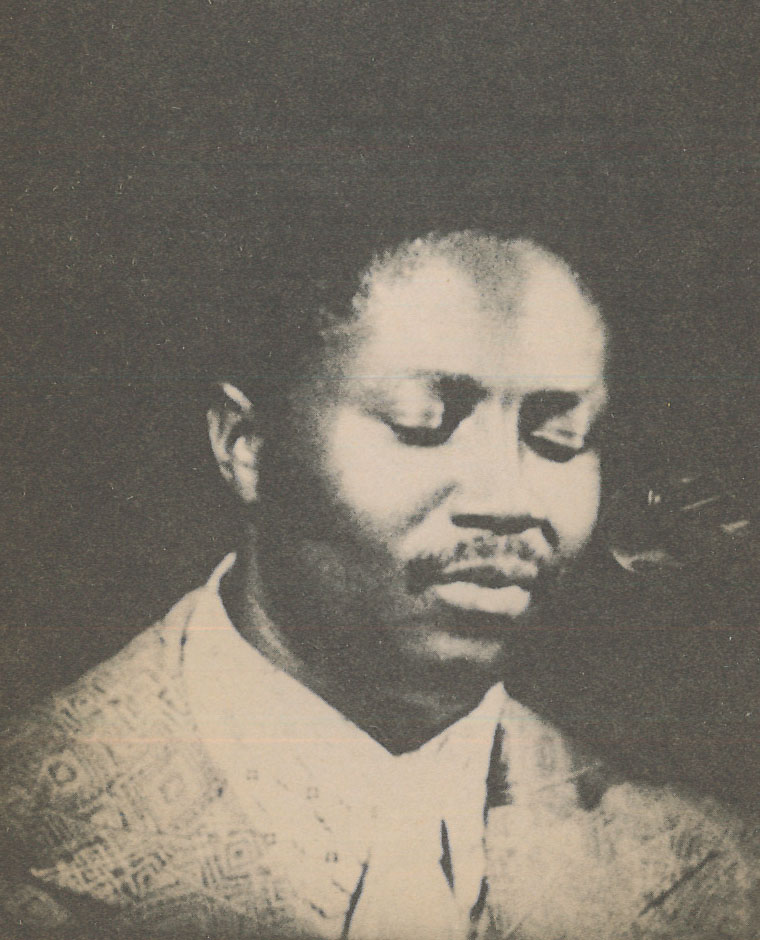
DONNY HATHAWAY
HOMETOWN: Chicago, Illinois
MUSIC SPECIALTY: Singer, composer, arranger, pianist, organist, percussionist
and ukulelist
BIGGEST HITS: "The Ghetto," "Tryin' Times," "A Song
For You"
ALL about Donny . . .
Donny sings like he feels -- soulful, from the heart! Born in Chicago in
1945, he grew up in the St. Louis ghetto. His grandmother, an accomplished
gospel singer named Martha Cromwell, brought him up in religious surroundings
so that, at the age of three, Donny was known as "Donny Pitts, the
Nation's Youngest Gospel Singer." He accompanied himself on the ukulele!
By 1964, Donny was attending Howard University on a fine arts scholarship and
trying desperately to decide whether to be a preacher or a teacher. While
still undecided, the high cost of Washington, D.C., living forced him to join
the Ric Powell Trio. This quickly became Donny's "introduction to
playing in the world."
Since then the name of Donny Hathaway has become a household word for such
fine artists as Curtis Mayfield, the Impressions, Jerry Butler, Roberta
Flack, the Staple Singers and many, many others who have come to him for help
with their albums. (He's produced, arranged, composed and performed on most
of their best LP's.)
On his own, of course, Donny has emerged as one of soul music's most soulful
singers. All you have to do is listen, 'cause that's what his music is all
about.
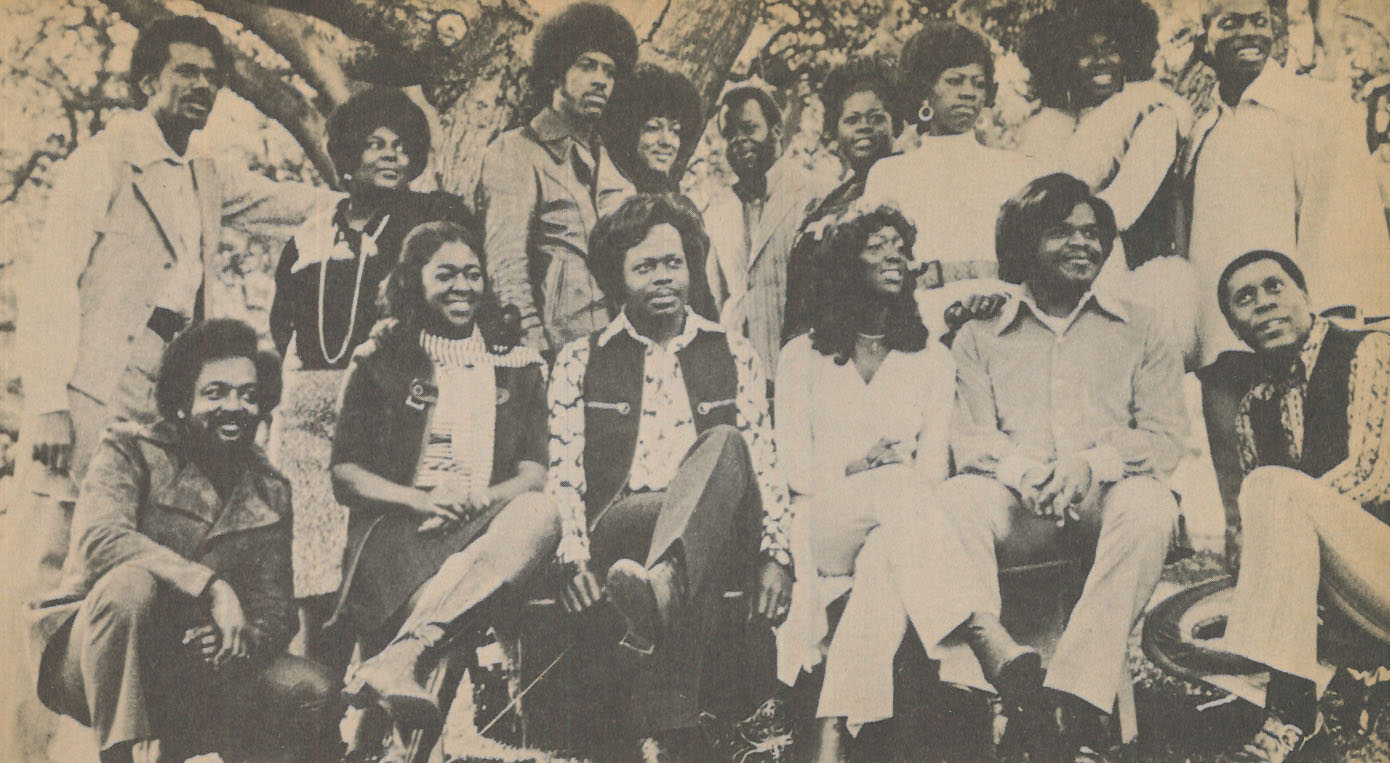
THE EDWIN HAWKINS SINGERS
HOMETOWN: Oakland, California
MUSIC SPECIALTY: Ten-man and woman gospel group
BIGGEST HITS: "Oh Happy Day," "Everyman Wants To Be Free"
ALL about the Edwin Hawkins Singers . . .
If any music ever deserved the title "soul" it's gospel music. For
centuries it has been sung and cried from the soul to the heavens, from empty
fields and uncounted four walls to the house of prayers. And in the world of
gospel music, Edwin Hawkins, a bright and talented young man, is counted one
of the best.
Playing piano since the age of five. Edwin studied interior design at Laney
Junior College in Oakland, but, because of his deep religious commitment, he
became involved with church choir music.
In 1967, at the age of twenty-four, Edwin and Betty Watson formed the
Northern California State Youth Choir. Its sole function was to perform at a
youth congress in Washington, D.C. But the response to the group was so
fantastic that they decided to make it a permanent choir and send its musical
word around the various colleges and churches of America.
Then came the phenomenon of 1969, when the members of the choir itself
contributed funds to make an album which they hoped would be distributed
within the confines of the gospel music world. The album contained the cut
"Oh Happy Day" and immediately made the group famous. Everyone was
listening to and singing "Oh Happy Day." Later that year, the group
was awarded the Grammy Award for their performance of "Oh Happy
Day." (They also won a Grammy for their recording of the song
"Everyman Wants To Be Free.") Consisting of Walter Hawkins. Daniel
Hawkins, Tramaine Hawkins, Elaine J. Kelley, Norma Jean King, Dorothy M.
Morrison, Barbara A. Gill, Shirley Miller, Edwin Miller and Donald E.
Henderson, the Edwin Hawkins Singers have come into the world of popular
music without losing a trace of their gospel roots. Their message is as
simple as it is beautiful: "Perhaps it is time for people to listen to
the past to feel secure in the future."
Their sound is the sound of hope.
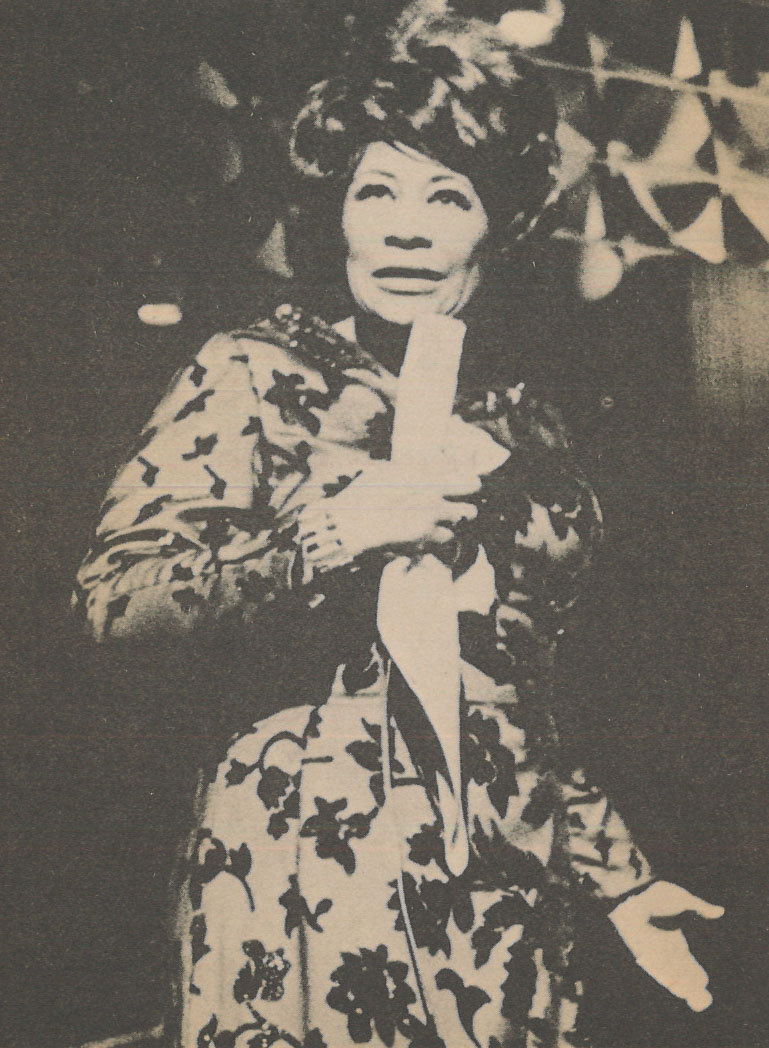
ELLA FITZGERALD
HOMETOWN: Newport News, Virginia
MUSIC SPECIALTY: Vocalist
BIGGEST HITS: "How High The Moon," "Oh Lady Be Good,"
"It Don't Mean A Thing If It Ain't Got That Swing," "Danse Samba"
ALL about Ella . . .
Anywhere in the world, all you have to do is mention the name
"Ella" and everyone knows who you mean.
Born in Virginia. Ella spent most of her early life being raised in Yonkers,
New York, with her real mother and stepfather, and enjoying her hobby-singing
and dancing. Ella's idol in those days was Connee
Boswell of the Boswell Sisters and, oddly enough, Ella preferred dancing to
singing.
Ella entered singing by appearing in an amateur contest at the Harlem Opera
House and began winning contest after contest. The audiences loved her, and
professionals were impressed by the unbelievable natural musicianship she
possessed. So Ella was hired by the opera house for fifty dollars a week
after auditioning for virtuoso drummer Chick Webb. He dug her enough to ask
her to travel with him on the road.
After Webb died, Ella, herself, continued in his band until the beginning of
World War II. Afterwards Ella met Norman Granz and
began touring with him and his JATP troupe. Norman took her under his wing
and became her personal manager.
Today Ella Fitzgerald is a legend. She loves appearing on television and is
always in demand by top shows. However, as far as Ella's concerned,
performing before a live audience is where it's
at! Her fame and awards are not just national. Her title in Europe is
"La Bella Ella" and she's won the highest honors for an artist in
Germany and East Berlin.
Despite the glamour and success, Ella's favorite place is in her home with
her family. This tight-knit group consists of her son, Ray Brown, Jr. (from
her marriage to the renowned bass player Ray Brown), her nieces, Karen and
Eloise, and her little grandniece, Valerie. This is the beginning and end to
Ella, and they join her on the road whenever possible.
Whether Ella is singing the tunes that bring back memories or her newer
numbers, she brings a feeling of pleasure into a world that has very often
forgotten how it feels.
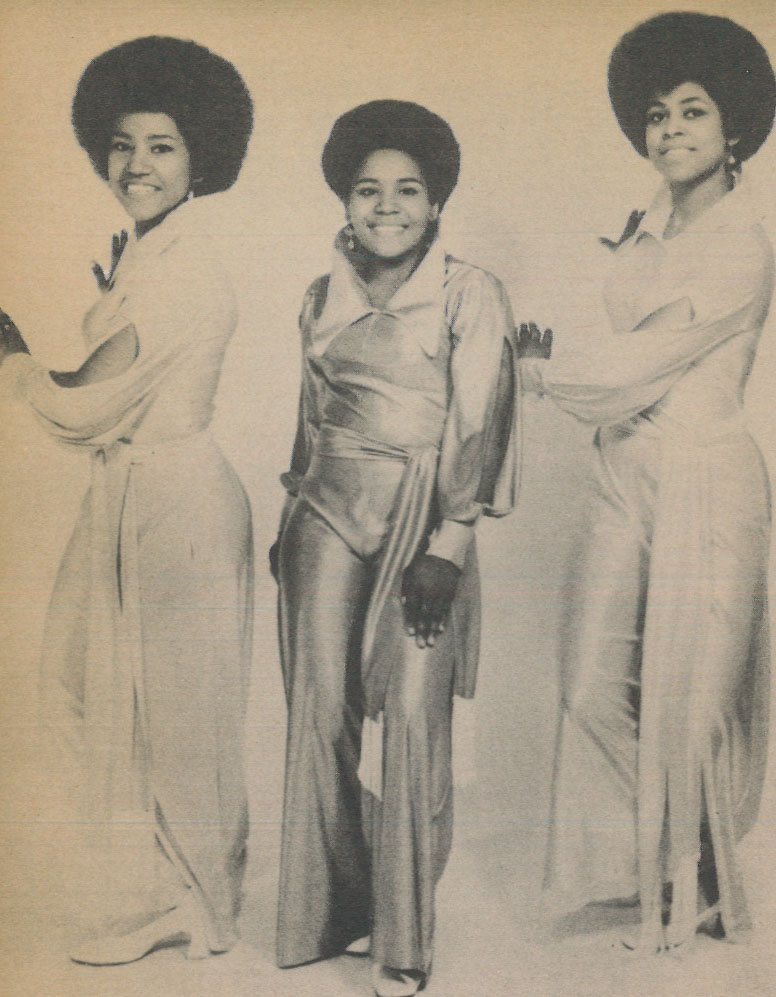
THE EMOTIONS
HOMETOWN: Chicago, Illinois
MUSIC SPECIALTY: Three-girl rhythm and blues group
BIGGEST HITS: "So I Can Love You," "Show Me How,"
"The Best Part Of A Love Affair"
ALL about the Emotions . . .
Sheila Hutchinson, Wanda Hutchinson and Theresa Davis are the ladies in
question when you're talking about the Emotions. Their magic is simple: they
can be happy, moody, sad, angry, sassy, stubborn, taunting, teasing and just
about any other emotion you can think of.
Today the girls (two of them sisters, the third a cousin) admit that the
biggest force behind their successful singing career has been Joe Hutchinson
(Sheila and Wanda's father).
"He wanted to get us interested in this -- and we did!" Wanda says.
"It's Daddy's lifetime ambition that we become the best," sister
Sheila adds. "When we were kids, we had music classes every day for an
hour and a half. We had to study music!"
And it really paid off! Their serious knowledge of music shows not only in
their singing but in the fact that all three are songwriters. Theresa wrote
"Welcome Home," Sheila wrote "Go Away, Don't Touch Me,"
and Wanda has already begun preparing lead sheets for their next album.
Originally the Emotions were comprised of three sisters. However, in May of
1970 Jeanette Hutchinson married, and cousin Theresa was brought in to take
her place.
Traveling extensively, the Emotions have appeared everywhere from the Sugar
Shack in Boston to Harlem's Apollo Theater.
As Wanda puts it: "Daddy doesn't want us to be established as a certain
kind of group that only sings certain kinds of songs. Our style is mostly
doing harmony. It's more of a 'class' thing. We use more variety in our
singing than most groups."
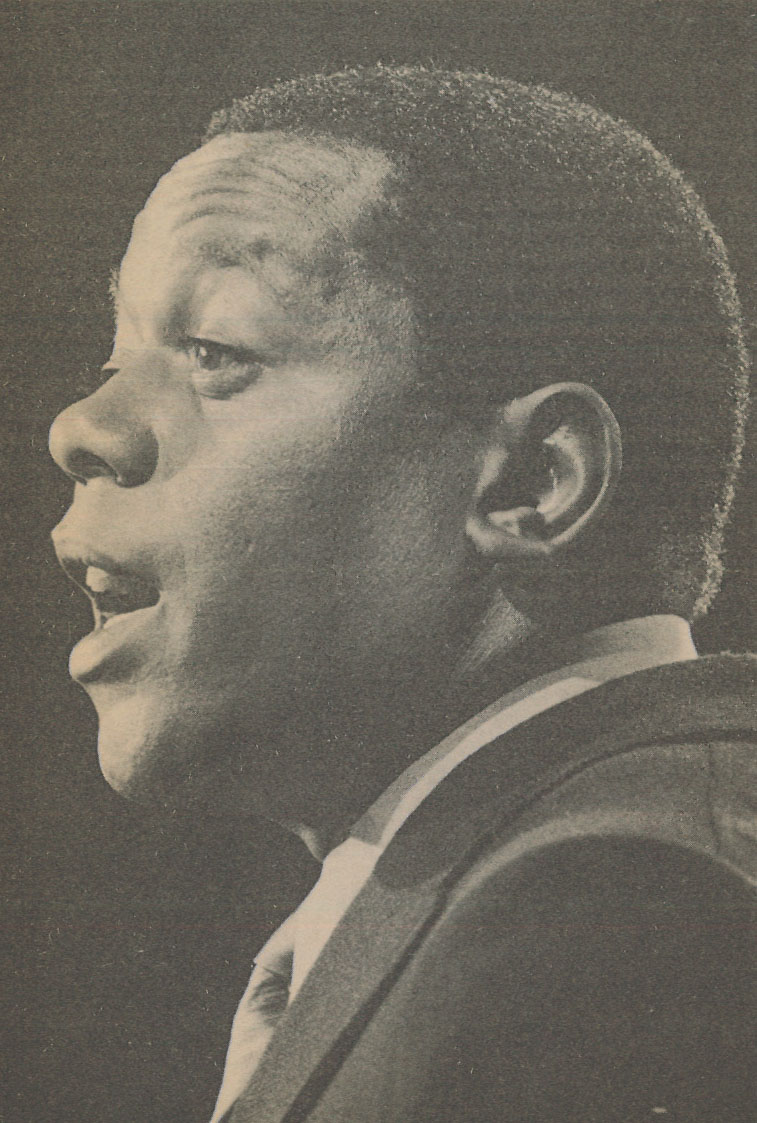
FLIP (CLEROW) WILSON
HOMETOWN: Newark, New Jersey
SPECIALTY: Comedian
BIGGEST HITS: "Cowboys," "Flippin',"
"You Devil You," "The Devil Made Me Buy This Dress"
ALL about Flip . . .
Flip Wilson decided on show business as his career in a small San Francisco
nightclub fifteen years ago. While doing an act as a drunk, the laughter he
received convinced him that comedy was his calling. He set a goal of fifteen
years to become a professional. In ten years, however, he appeared on the
Tonight Show, and as Flip himself says, it only took "ten years and five
minutes."
Flip Clerow Wilson was born in Newark, New Jersey,
and spent his childhood moving from one foster home to another. A dropout
from high school, he entered the Air Force, where he picked up the nickname
"Flip" for his quick wit.
When he left the service, Flip became a janitor at the club in San Francisco.
From California, he traveled around the country, entertaining whenever he
could, depending on the generosity of people for his living. He was so good,
generosity seems irrelevant.
Today Flip has four children from a very unhappy marriage in 1957. Insisting
on privacy, he doesn't socialize much but prefers entertaining close friends
at home.
For his award-winning TV show, The Flip Wilson Show, Flip writes most of his
own material and with painstaking care. His favorite monologue took him three
years to get right. (A typical Flip thing! He's a perfectionist all the way!)
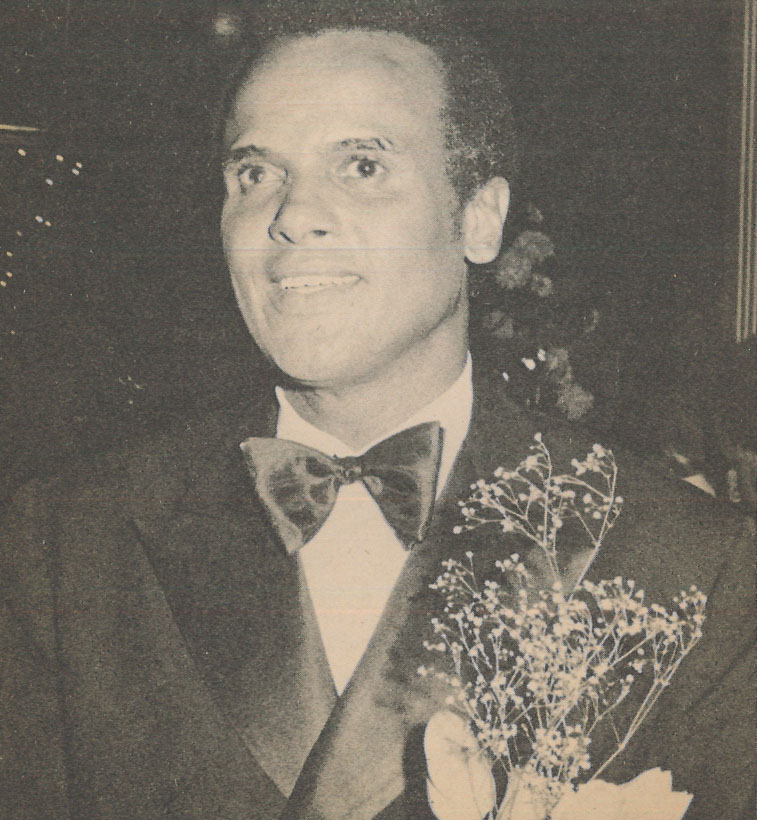
HARRY BELAFONTE
HOMETOWN: New York, New York
MUSIC SPECIALTY: Vocalist
BIGGEST HITS: Mark Twain, Porgy and Bess -- Lena Horne -- Harry Belafonte, Midnight
Special, Belafonte -- Don't Stop the Carnival
ALL about Harry . . .
In many ways, the quality of today's music had its beginnings with Harry
Belafonte.
Born in New York City, Harry moved with his family to Jamaica, British West
Indies, while still a young boy. After living there for five years, he
returned to New York and attended but never completed George Washington High
School.
After a two-year hitch in the Navy and a stint as a maintenance man, he
received two tickets to an American Negro Theater production. This served as
his introduction to legitimate theater. Harry soon became a member, with very
close friend Sidney Poitier, and then joined the Drama Workshop. One
production number called for him to sing and that led to a job at the Royal
Roost, a New York nightclub. The original contract was for two weeks but he
ran for twenty! After this his career as a pop singer was launched.
But Harry wasn't really happy, so he quit to find his calling in show
business or get out. For a while, he and two friends ran a restaurant in
Greenwich Village where he earned $70 a week. During this time there were
frequent community sings where Harry found satisfaction in folk singing; he
decided to return to show business doing dramatic interpretations of ethnic
tunes.
From there he signed a contract with RCA Records and was in two motion
pictures (Bright Road and Carmen Jones). His third film, I stand in the Sun,
caused much controversy but was a box-office sell-out everywhere.
In 1955. Harry became a full-fledged star on Broadway in Three for Tonight.
More recently, he formed his own record-producing firm, Artists Recording
Center, Inc., a division of Belafonte Enterprises, Inc.
Harry entered the medium of television at special intervals. Revlon's Tonight
with Belafonte won him an "Emmy" for the top musical performance.
Now he is becoming increasingly active as a producer as well as a performer
on TV.
Harry is the first member of the entertainment industry named a cultural advisor to the Peace Corps by the late President
Kennedy. He is also a leading architect of the civil rights movement. He's
been honored many times by the American Jewish Congress, the NAACP, the City
of Hope, etc. He has introduced both South Africa's songstress, MiriamMakeba, and Nana Mouskouri,
Greece's foremost singer, to American audiences. His association withWiltwyck School for Boys in Upper New York State is known
all over the United States.
Harry Belafonte seems to know no limits and his songs reach every level of
people, of every field and every area of expression, all over the world.
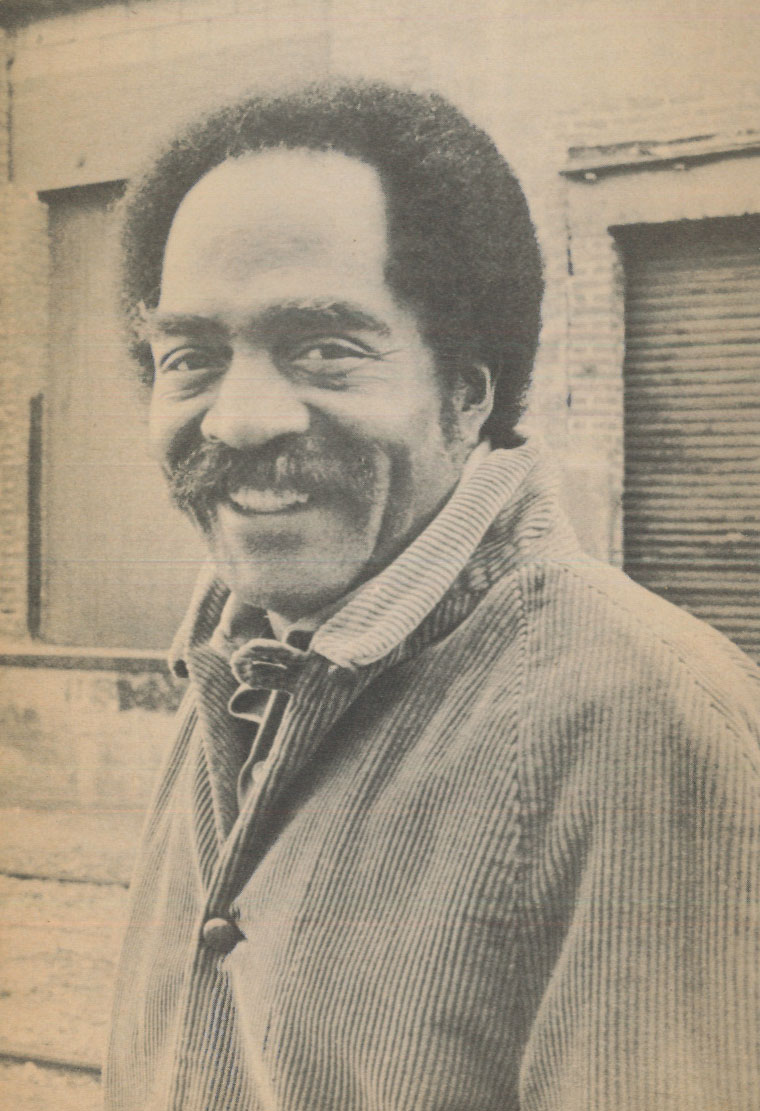
JIMMY WITHERSPOON
HOMETOWN: Gurdon, Arkansas
MUSIC SPECIALTY: Vocalist
BIGGEST HIT: "Handbags and Gladrags"
ALL about Jimmy . . .
In a way, Jimmy Witherspoon owes his career to his father's job as brakeman
on a railroad. His mother had a railroad pass and, at the age of fifteen,
Jimmy forged her name on it and took off for Los Angeles with his brother. He
hooked a job as dishwasher/cook and stayed there until he was caught by the
truant officer.
At nineteen, Jimmy joined the Merchant Marine.
While in port in Calcutta, he went to the Grand Hotel where Teddy Weatherford
and his band were playing. He asked to sing and did, and he attributes his
beginning in music to this.
In 1952, Jimmy had his first hit, "Ain't Nobody's Business," and it
felt good. Blues were not very popular at that time and it was a period of
depression for Jimmy. The "Spoon" left the scene for a while and
was then discovered working for a club in Newport, Kentucky, for about $75 a
week.
Then came the happiest moment of his life. Jimmy was flown out to the
Monterey Jazz Festival where his mother heard him sing for the first time.
Blues is in now and Jimmy looks on his talent as an art. When he sings the
look on his face is unmistakable dignity.
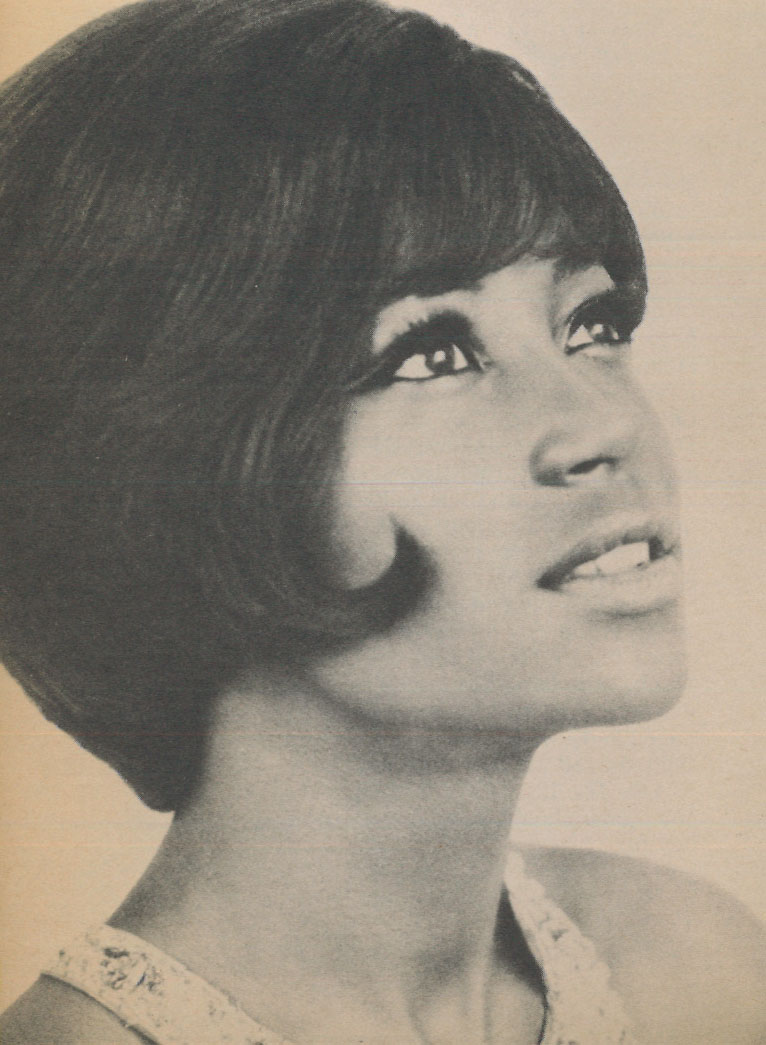
KIM WESTON
HOMETOWN: Detroit, Michigan
MUSIC SPECIALTY: Pop/rhythm and blues singer
BIGGEST HITS: "Love Me All The Way," "Take Me In Your
Arms," "Helpless"
ALL about Kim . . .
Kim Weston is no overnight sensation. She knows better. Facing the ups and
downs of her large career with confidence, Kim is a girl who has more than
paid her share of dues in show business.
"I never wanted to be a star," the attractive songstress says.
"It wasn't my goal when I was a child. But because it did happen that
way, I knew it was right. It was supposed to happen."
Born in Detroit, Kim sang in her church choir and later with a leading gospel
group, the Wright Specials.
"Being exposed to other elements of the entertainment world, like acting
and dancing, I began to want a career in show business. Up to then I enjoyed
singing, but it just wasn't enough. When I saw there were so many other
avenues of entertainment that I could travel, I developed the direction and
incentive to become a performer-not just a singer, but an entertainer. A
total performer!"
After illness removed Kim from the road company of Hallelujah Baby!, she
returned to Los Angeles to lay the groundwork for her future. One of her
ideas, a gospel choir made up of young people in her church, the Tabernacle
of Holiness in Los Angeles, is now a reality. Encouraged, the popular singer
recorded Kim, Kim, Kim. About the LP, she says: "Truth is where it's at
and that's what I'm trying to say through my songs."
In addition to her many other interests, Kim accepted Reverend Jesse
Jackson's request for her to organize the choir for his Los Angeles chapter
of Operation Breadbasket.
Earlier this year, the 3,000-member student body of Compton High School paid
tribute to her for two songs she recorded nearly two years ago on her This Is
America album, "Lift Every Voice And Sing" (the black national
anthem) and "This Is America." But unlike so many other performers,
Kim's involvement with young people isn't something that began when she
became a star. She's a giver and always has been. And what she gives is
herself.
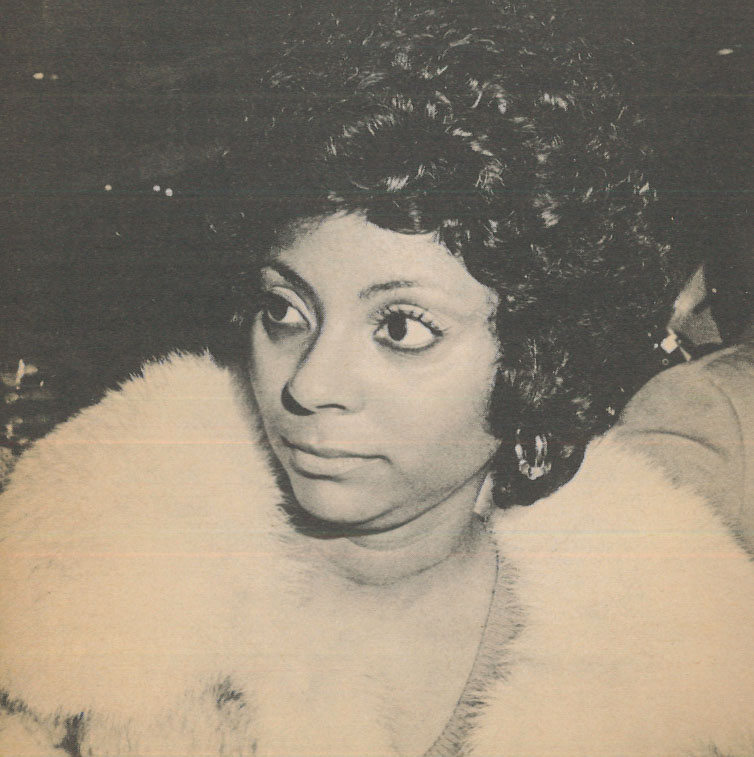
LES MCCANN
HOMETOWN: Lexington, Kentucky
MUSIC SPECIALTY: Jazz/blues singer-pianist
BIGGEST HITS: "Compared To What," "Papa Good Times"
ALL about Les . . .
Dressing himself and his group in colorful suede vests and his own personally
designed Spanish plantation hats. Les McCann comes on as a total original.
When he sits down at the piano, you know he is!
In addition to being one of the foremost jazz attractions in the world. Les
is credited with such things as discovering singer Roberta Flack,
collaborating with lyricist Johnny Mercer on the song "Papa Good Times,"
and doing all the splendid still photography for Bill Cosby's 1968 television
special. A man of many talents indeed!
Born September 23. 1935, in Lexington, Kentucky, Les was one of six children
James McCann supported by working as a maintenance engineer at the Lexington
Water Company. Piano lessons started at the age of six for Les (at 35 cents a
lesson!). But his biggest musical influence was really the Shiloh Baptist
Church. Practically raised in church, gospel music became his strongest
energy force.
Assigned to the Drum and Bugle Corps of the Navy, Les switched to jazz after
hearing Erroll Garner's recording of "Lullaby Of Birdland" at the
local PX one day. Being stationed near San Francisco, he often went to see
Sarah Vaughn, Oscar Peterson. Dizzy Gillespie and Stan Getz. This exposure
further inspired him to get an act together. He entered the All Navy Talent
Show and won an appearance on The Ed Sullivan Show. Shortly after, Les had
his first big gig as the leader of a piano trio on weekends at the Purple
Onion on Sunset Strip. One night Miles Davis and Cannonball Adderley stopped
in to hear Les. Adderley asked him to join his new group, but Les declined,
preferring to head his own.
Even then both Miles Davis and Cannonball Adderley knew Les had made the
right decision. Today everyone knows. Les' sensational tours of Europe have
been hailed as some of the finest examples of American jazz ever.
Today Les' jazz group is made up of Les, Jimmy Rowser (bass). Donald Dean
(drums) and Buck Clarke (African drums).
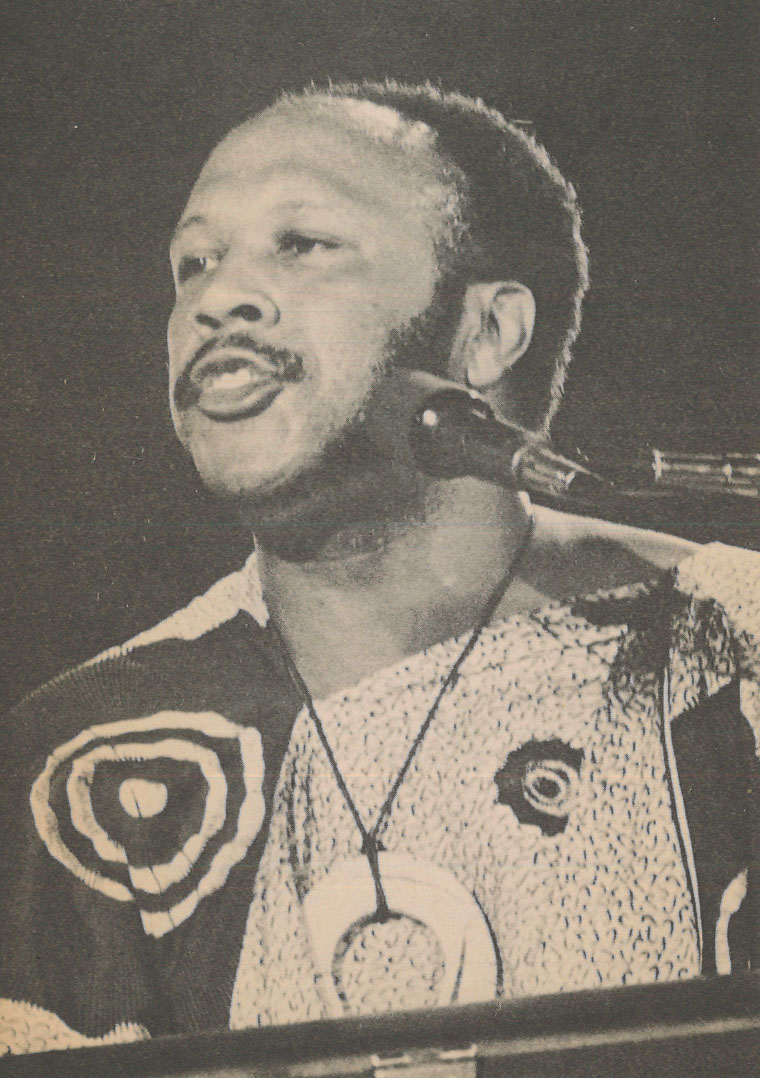
LESLIE UGGAMS
HOMETOWN: Washington Heights, New York
MUSIC SPECIALTY: Pop and musical comedy singer
BIGGEST HIT: Hallelujah Baby! (Broadway musical)
ALL about Leslie . . .
In her mid-twenties, Leslie Uggams has achieved stardom in the Broadway
theater (Hallelujah Baby!), on a weekly television series (The Leslie Uggams
Show), on her own TV special (Hallelujah Leslie!) and is the toast of the
nightclub circuit. And yet, unlike so many of her peers, Leslie's success
story is not of the "Cinderella" nature at all. Pain, poverty and
desperation may be the usual struggling performer's source of energy-but the
truth of the matter is that Leslie never had it rough!! The granddaughter of
two ministers, she was raised by her parents who had a fairly good income all
of their lives. Her mother was once a chorine at Harlem's famous Cotton Club,
and her father sang with the famed Hall Johnson Choir.
Leslie made her show biz debut at six, with Ethel Waters on the Beulah
television series. She followed this up with appearances on the Milton Berle,
Gary Moore and Arthur Godfrey shows, until, at fifteen, she won $25,000 on
Name That Tune!
Mitch Miller, then in charge of the A&R department of Columbia Records,
was so impressed by little Leslie's rendition of "He's Got The Whole
World In His Hands" that he immediately signed her to a contract. In
October of 1959, her first solo album was released, and in less than a year
she was given a solo spot in one of the stage extravaganzas at Radio City
Music Hall. In January of 1961. Leslie became a star of Mitch Miller's new TV
series Sing Along with Mitch.
When Mitch's show achieved nationwide acclaim, Leslie did too. The national
tour of supper clubs, which followed, highlighted her rapidly blooming
career. Having already confided to an interviewer that her ambition was to
star in a musical comedy, she jumped at the chance to play the lead in a Berkeley
revival of The Boy Friend The reviews were all raves for Leslie!
Now that she had demonstrated her potential as a star, it was only a matter
of months before Broadway had a show to match her abilities: Hallelujah Baby!
became Leslie's vehicle straight to superstardom! Her performance as
"Georgina," the young girl whose progress up the social ladder
mirrors the evolution of the civil rights movement in the United States, was
unanimously praised. The show was a smash and Leslie was most of the reason why!
As a result, she won the much desired Tony Award (Broadway's
"Oscar") as "Best Musical Comedy Actress of the Year."
Besides Hallelujah Baby! Leslie took on the rather difficult production of
Her First Roman in 1968, a musical based on Caesar and Cleopatra.
Happily married to producer Grahame Pratt, Leslie resides in Hollywood with
her husband and two dogs (a Great Dane and a Yorkshire terrier).
As Mitch Miller once put it: "Singers like Leslie come along once in a
lifetime-I'm glad it happened in mine!"
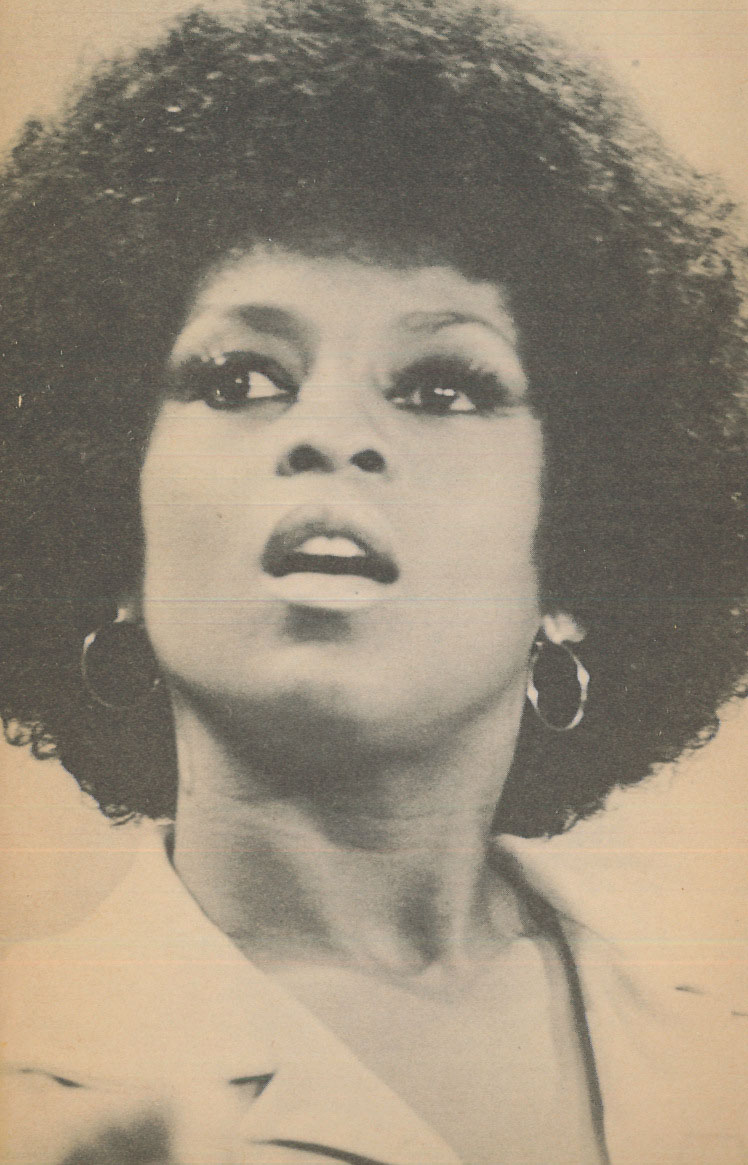
LOLA FALANA
HOMETOWN: Camden, New Jersey
MUSIC SPECIALTY: Singer
BIGGEST HIT: Golden Boy (Broadway musical)
ALL about Lola . . .
Whatever Lola wants, Lola's likely to get it! Not by luck or hope, but by
hard work.
Foxy Lola Falana, who was featured in Sammy Davis' hit musical Golden Boy,
left her home twenty-three years ago with a determination to become a
Broadway star. She always wanted to be a female Sammy Davis and under his
advice and encouragement she has a very good chance.
Lola has had quite a bit of television exposure in the United States plus all
her shows in Italy. After being a smash there she went on to do three motion
pictures. When she returned she played a wide circuit of nightclubs.
Lola's family moved to Philadelphia and when she left school she taught
dancing for a while. After being a member of a dance trio, a singer with
Mickey Collins' orchestra and then a singer-dancer with Dinah Washington,
Lola hit Broadway. She performed in George White's Scandals and America Be
Seated at the World's Fair.
Then came Golden Boy, and Lola Falana was on her way. With "guts" and
extreme talent she will know no limits, for as she says, "l can't
function without a challenge." And with each challenge, Lola crosses
over to the next.
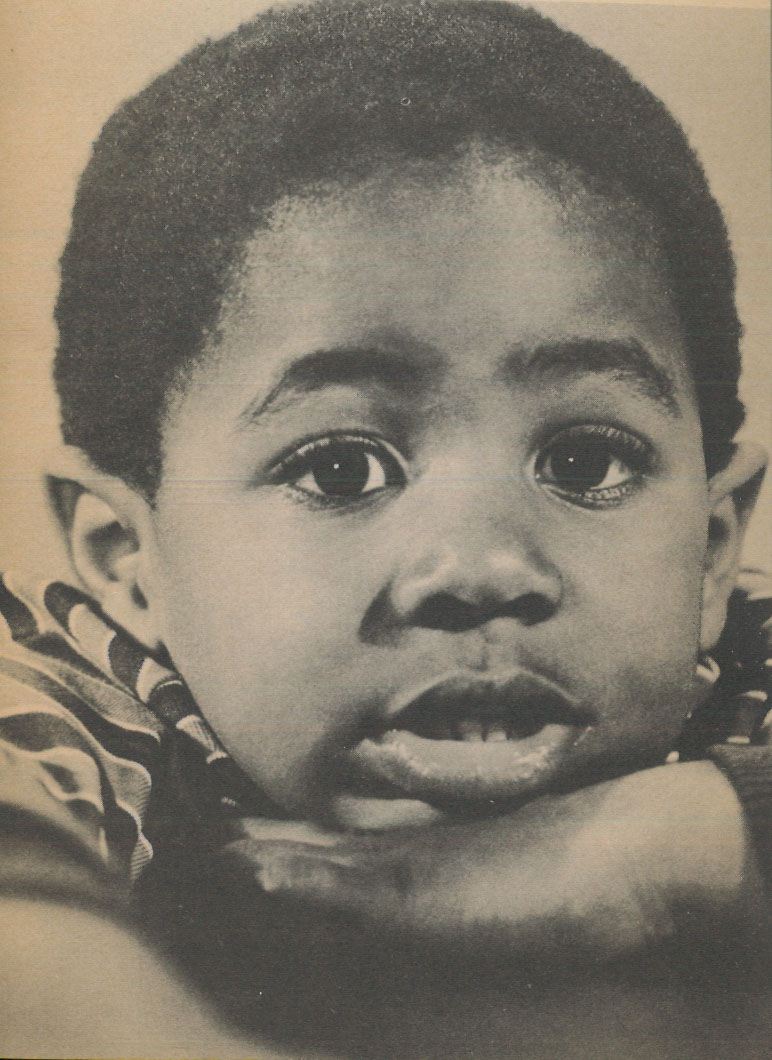
MARC COPAGE
HOMETOWN: Hollywood, California
MUSIC SPECIALTY: Vocalist
BIGGEST HITS: "Riding High," "Will It Be Me"
ALL about Marc . . .
Marc Copage (of "Cory" fame on Julia) was born June 21. 1962, at
the Hollywood Presbyterian Hospital.
His brother, Eric, is a professional actor and a musician. Since both his
parents have backgrounds in acting and music, the way for Marc .vas pretty
well paved.
By the age of two. Marc loved imitating his favorite television performers.
When he turned five, he was interviewed for the TV show Julia . Finally, the
next year, Marc received his first record contract from Metromedia Records.
Two of Marc's most prized possessions are a letter from President Nixon and
the key to the city of Houston, Texas. His parents separated when he was two
and his father, John, became his personal manager, drama coach, musical
supervisor, script writer and publicity coordinator.
Today Marc is playing with a group called the Merging Traffic, in which his
brother plays electric bass. Marc is being approached by motion picture
producers, television personnel and for foreign tours, so it looks like he
has a long career to look forward to.
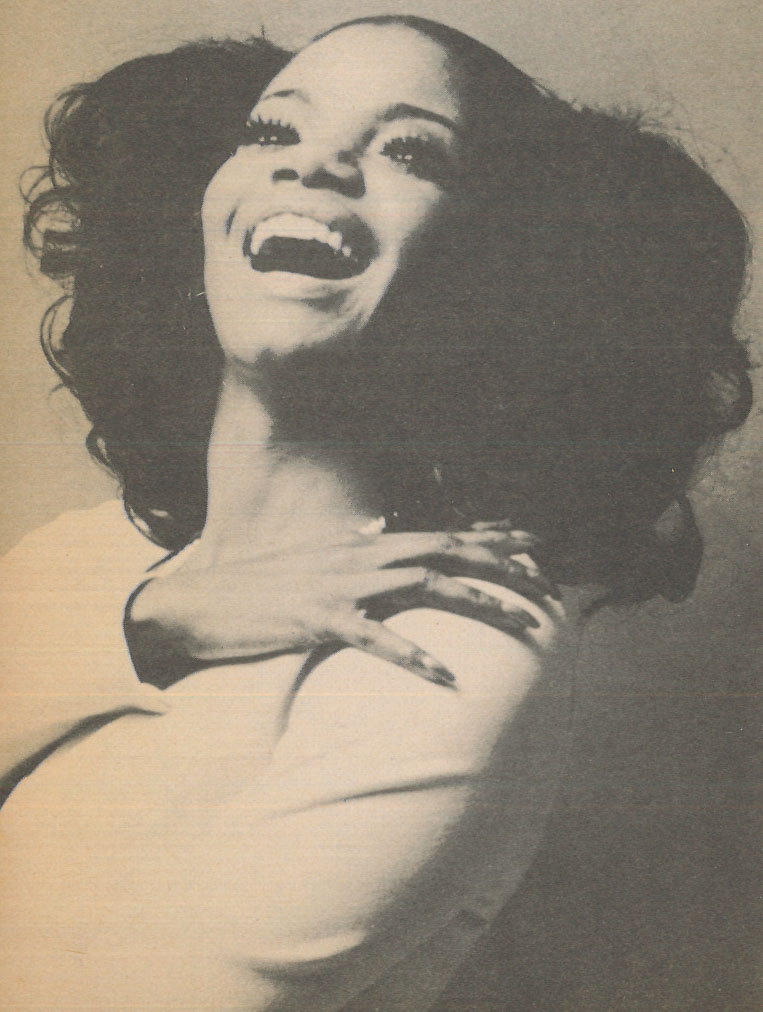
MELBA MOORE
HOMETOWN: Harlem, New York, and Newark, New Jersey
MUSIC SPECIALTY: Vocalist
BIGGEST HITS: Purlie, Hair (Broadway shows)
ALL about Melba . . .
Melba Moore was born Melba Moorman into a black show business family in the
Harlem area. (Her parents still work the cocktail circuit as a piano and
vocal duo.) Melba moved to Newark, New Jersey, with her family after the
third grade.
After graduating from Montclair State Teacher's College, Melba taught in
ghetto schools for a period of time. Her course was music and her rapport
with her students was remarkable! (She even had the seventh graders singing
"Moon River" in seven parts!)
Being dissatisfied with the system and the lack of care for the students,
Melba left and began performing herself for the first time. After doing some
commercials she eventually stepped into the lead role in Hair.
Melba also won Broadway's Antoinette Perry Award for the "Best
Performance by an Actress in a Supporting Role" in the musical Purlie.
Today Melba performs in Vegas and gets a good deal of television
exposure-exposing her truly fantastic talent!
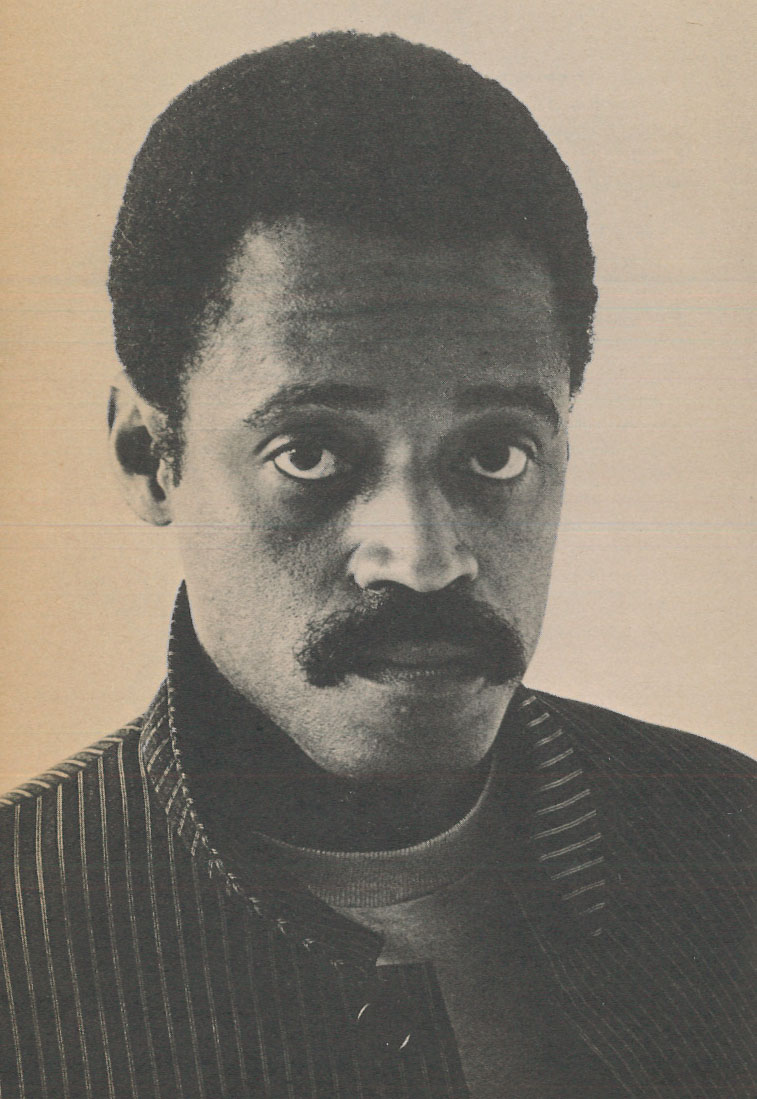
MELVIN VAN PEEBLES
HOMETOWN: Cleveland, Ohio
MUSIC SPECIALTY: Singer, writer, filmmaker
BIGGEST HIT: "Sweet Sweetback"
ALL about Melvin . . .
Melvin Van Peebles sings songs and makes movies that often get people very
upset!
"Sweet Sweetback is my story," the talented Ohio Wesleyan
University graduate says plainly. "It's the story of the black man on
the street. If people react to it in any other way-that's their
problem!"
A typical Van Peebles' remark. Always the center of controversy, Melvin's
first film (made in French), The Story of a Three-Day Pass, pretty much set
the trend of his career. Watermelon Man, his first American movie (which
starred Godfry Cambridge), told the story of a white bigot who one day woke
up to find that he had turned black. Wham!! More controversy for Van Peebles.
His two albums for A&M Records, Brer Soul and Ain't Supposed To Die A
Natural Death, are hardly "easy listening" either.
"The whole idea behind the two albums was to make people listen to my
speaking rather than singing. They're albums that black people can understand,
but if white people take the time to learn the niceties of black culture,
they too will be able to appreciate them."
An original all the way, Melvin Van Peebles' enormous success over recent
years has more than proved, the need for his forceful, though often angry,
talent.
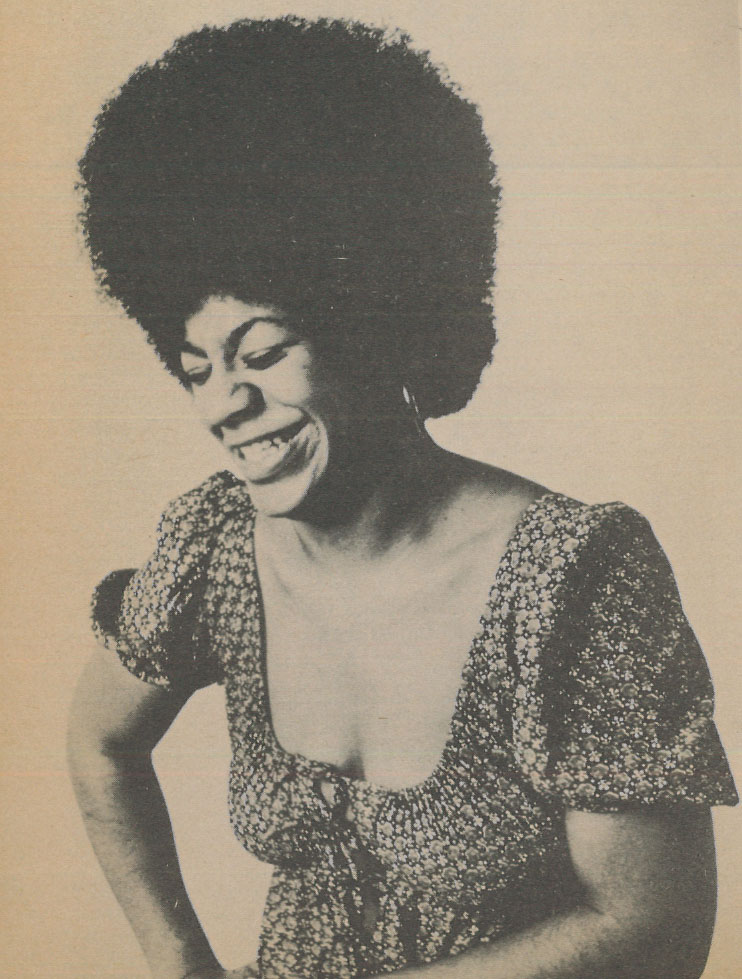
MERRY CLAYTON
HOMETOWN: Gert Town, New Orleans
MUSIC SPECIALTY: Gospel-soul-blues singer
BIGGEST HITS: "Lift Every Voice," "Gimme Shelter"
ALL about Merry . . .
If the name Merry Clayton is new to you it's not because you haven't heard
her sing! You have. Again and again. You just didn't know it was Merry!
For example:
Remember Bobby Darin's duet gold record "You're The Reason I'm
Living"? Merry was the other half of that duet. Remember Ray Charles'
traveling chorus group the Raelettes? Merry was one of them. Remember that
special gospel-rock voice that backed up the Supremes, Elvis, Pearl Bailey,
Phil Ochs, Joe Cocker and Carole King on their best records? It was Merry!
Remember the girl who sang "Lift Every Voice" during the titles of
the controversial film Brewster McCloud? It was Merry. And, most important,
remember the back-up voice unleashed on the cut "Gimme Shelter" of
the Rolling Stones' famed Let It Bleed album? That too was Merry Clayton. And
that last one finally made her the star she never really thought about being.
It took Merry five minutes to get through "Gimme Shelter" for the
Rolling Stones in the summer of '69. By the end of the cut she had a new
friend -- record producer Lou Adler (Mamas and Papas). Lou signed Merry to a
contract with his record company, Ode, and for the first time Merry stepped
into the studios to sing for herself. The result was an album called Gimme
Shelter. Then came her second LP, entitled simply: Merry Clayton. Who, you
might ask, backed up Merry -- world-famous back-up singer -- when she moved
into the solo spot? Well, people like Carole King and Billy Preston, that's
who! After all, it's the least they could do for the lady who sang her way
right out of their background!
As her own record company put it: "She's from Gert Town, New Orleans.
The daughter of a Baptist reverend. Almost everyone calls her 'Baby Sister.'
And she calls everyone 'Two' because 'Curtis is One!' She sings with wisdom,
intensity and drive far beyond her twenty-three years. It's communication of
the highest order . . . and Lord, is she ever funky!!"
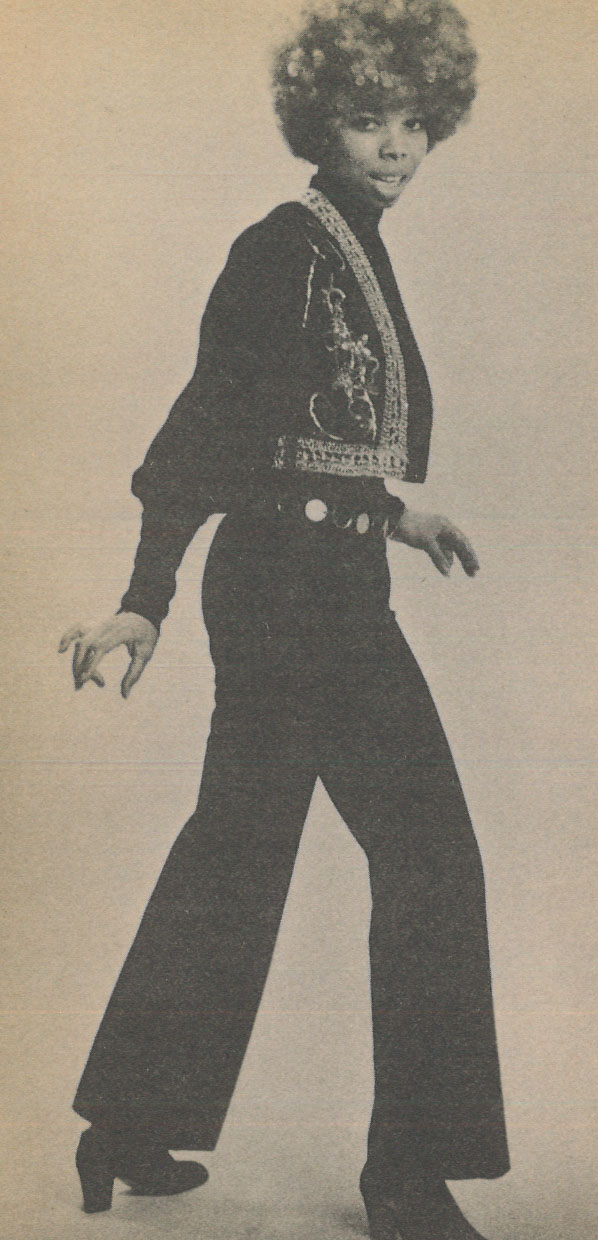
MILLIE JACKSON
HOMETOWN: Thomson, Georgia
MUSIC SPECIALTY: Vocalist
BIGGEST HIT: "A Child Of God"
ALL about Millie . . .
At fifteen years of age, Millie Jackson left home in Georgia to find her
future up north. Being a little wary of New York, she settled in Newark, New
Jersey, and began singing and modeling.
In 1961. Millie moved to Brooklyn. By that time her voice had developed
beautifully. Being seventeen, however, she was unable to get a job in any of
the cabarets. So Millie worked at regular employment and became adept at
piano and song writing.
Finally, in 1964, Millie built a reputation on the
"Chitlin' Circuit" as one of the best female soul singers around.
Her experience included singing background for Sam Cooke's brother, L.C..
Little Richard and many others.
Her big break came when she met producer/writer Don French and they wrote
"A Child Of God" together.
It was a hit and Millie prepared to go on a major tour. Before she embarked,
however, she picked up her liberal arts diploma-keeping her promise to
herself and her family to finish her schooling.
Millie, who has had no formal training and didn't really start singing until
she arrived in Newark, explains her success like this: "When it hit me,
it hit hard and I couldn't stop if I wanted to."
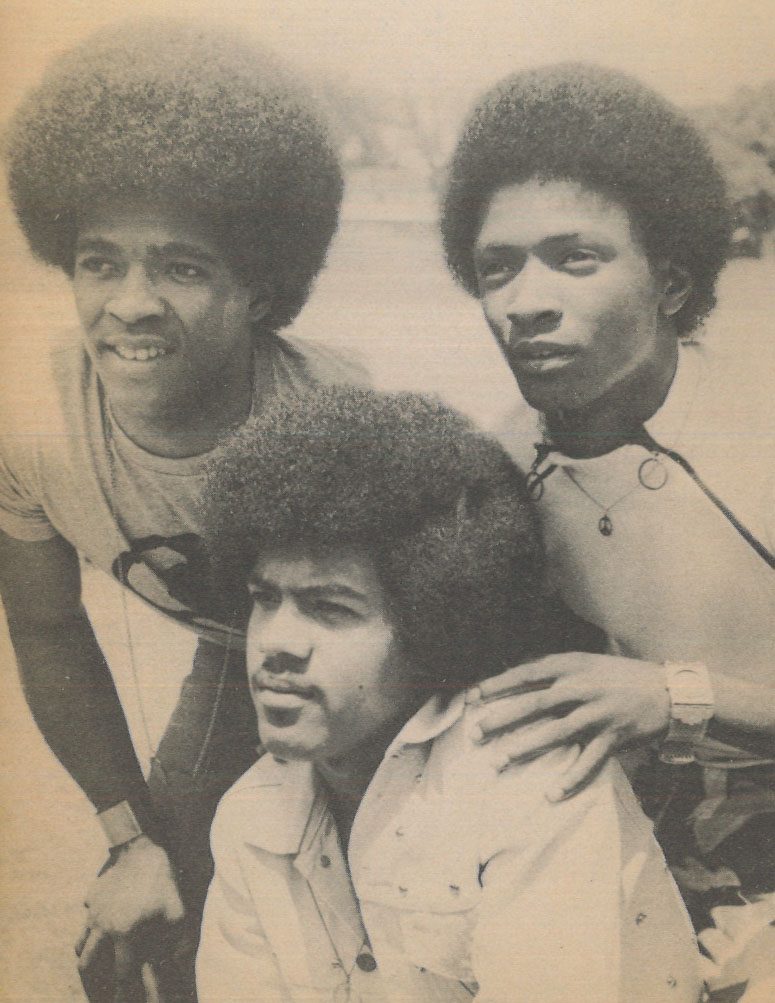
THE NEWCOMERS
HOMETOWN: Memphis, Tennessee
MUSIC SPECIALTY: Three-man rhythm and blues group
BIGGEST HIT: "Pin The Tail On The Donkey"
ALL about the Newcomers . . .
The Newcomers are Terry Barlett (18). Bertrand Brown (18) and William Sumlin
(19) -- but they're only new in the sense that they've helped to bring an
upsurge of talent into the music arenas of today!
As their record producer Allen Jones put it: "I've worked with such
talents as Isaac Hayes, Bar Kays and the late Otis
Redding, and I see in the Newcomers that same genius quality that I found in
these other artists!" Jones, who discovered them on three
occasions (Bertrand on a school talent show. Terry when he auditioned to be a
singer for a school band, and William at the Memphis Showcase), has had much
to do with the group's strength and success.
Unlike most high school students today. Terry.
Bertrand and William have found that they not only have to deal with the
problems of "teen-age-mania" but the problems of being
"professional singers" as well.
"There are some things I can't do at school when my mind is on how a
session will go at the studio!" Bertrand explains. "So I just tell
myself that one thing is just going to be better than the other that
day."
All from the Memphis area, the Newcomers take pride in joining the long list
of Memphis soul stars that have become musical giants by simply putting their
"just plain folk" roots on records.
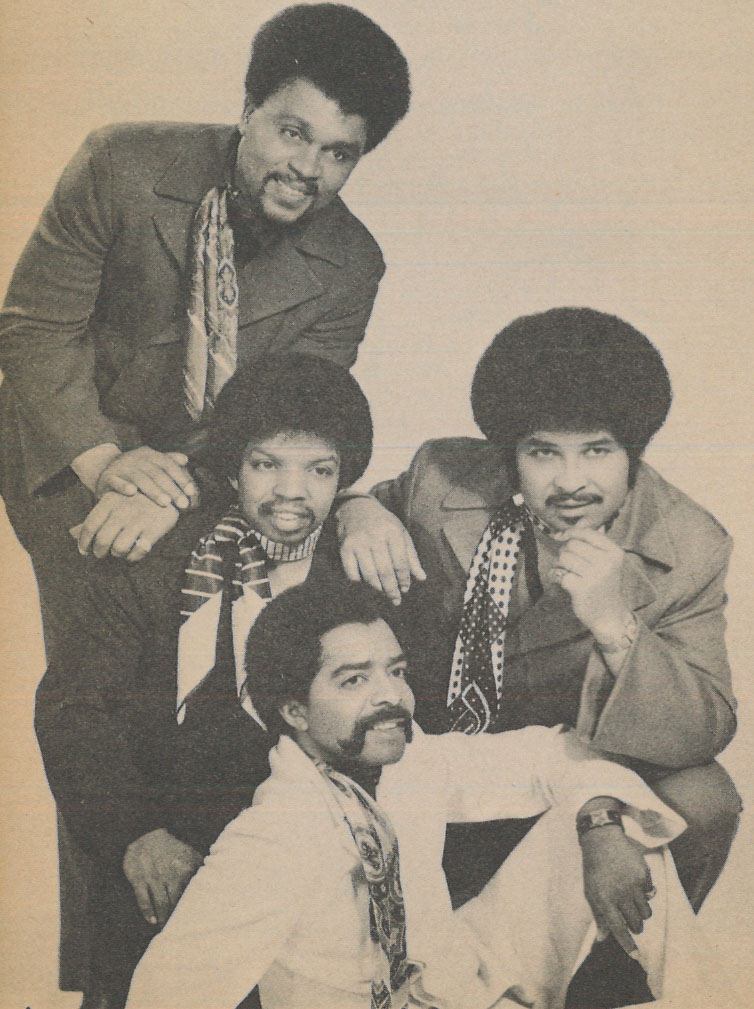
THE ORIGINALS
HOMETOWNS: Freddie, Henry and C.P.: Detroit, Michigan; Walter: Augusta,
Georgia
MUSIC SPECIALTY: Vocal group-four members
BIGGEST HITS: "Baby I'm For Real," The Bells, Portrait of the
Originals
ALL about the Originals . . .
The four Originals perform through many different forms of music with a
unique polish and professionalism. They are fantastic as a group and yet each
usually has a chance to solo in most of their songs.
The immense talent of the Originals did not just happen on the spur of the
moment. The members have been singing together since 1965 and have worked a
long apprenticeship singing background to the more well-known performers of
Motown Records.
The big break came for the Originals when they cut "Baby I'm For
Real," written by Motown's Marvin Gaye. This led to a gold record and an
album of the same name. The LP contained two tunes composed by the group and
four more written by Freddie Gorman.
Freddie, the bass singer, is quite a composer in his own right, having
produced the smash "Please. Mr. Postman" sung by the Marvelettes.
While studying voice and music theory Freddie played the saxophone in his
high school band. He was a solo act in Detroit nightclubs before joining the
group.
The tall thirty-year-old baritone, Walter Gaines, began singing in his
hometown church choir. Walter spent a good deal of his time being a postman,
feeling secure in the civil service. However, his dreams and ambitions went
far beyond that and Walter found his career in show business.
Henry Dixon, the tenor, was also about to live his life in another career. He
had been in the Army for eight years and was planning to make it his life's
work. But Henry's instincts led him to the field of entertainment and
eventually to the Originals.
The youngest and shortest member of the group, C.P. Spencer, stands tall when
he lets out with his smooth first tenor. He went into music with his parents'
encouragement and fills in perfectly the blend of voices in the quartet.
The Originals believe wholly in the theory that each member must first
perfect his own style in order for the whole to be together. The rhythm and
harmony of their sound proves this belief well founded, and the result is
simply supersoul!
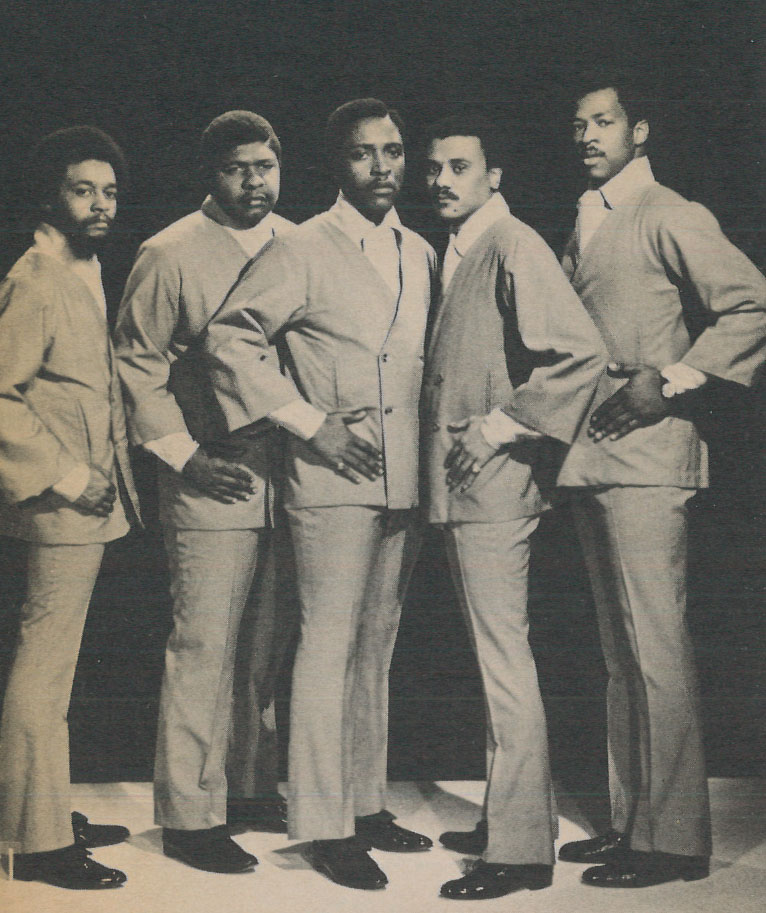
THE PERSUASIONS
HOMETOWNS: Jayotis Washington: Detroit, Michigan: Joseph Russell: Henderson,
North Carolina; James Calvin Hayes: Hopewell, Virginia; Herbert L. Rhoad:
Bamberg, South Carolina; Jerry Lawson: Fort Lauderdale, Florida
MUSIC SPECIALTY: Five-man a cappella group
BIGGEST HIT: The Persuasions
ALL about the Persuasions . . .
The Persuasions are made up of five super-talents (Jayotis Washington, Joseph
Russell, James Calvin Hayes, Herbert Rhoad and Jerry Lawson) who do a rather
amazing thing: they sing a cappella -- that is to say, they sing without any
instrumental accompaniment. Pretty scary, right?
Without the aid of loud guitars, drums, horns and whatever else most of the
rhythm and blues world is filled with, the Persuasions have accomplished the
impossible. Performing everywhere from subway stations at 125th Street to
Lincoln Center's Philharmonic Hall -- the Persuasions have much to be proud
of.
As Jayotis puts it: "When I met the Persuasions I thought -- what a fine
bunch of brothers! Man, are they ever together. We've been through and are
still going through our trials and tribulations, but it's worth it!"
Bravely doing something no other group has ever tried, the Persuasions are
bound to wind up on top. Anything original takes time to happen -- but it
always does happen!
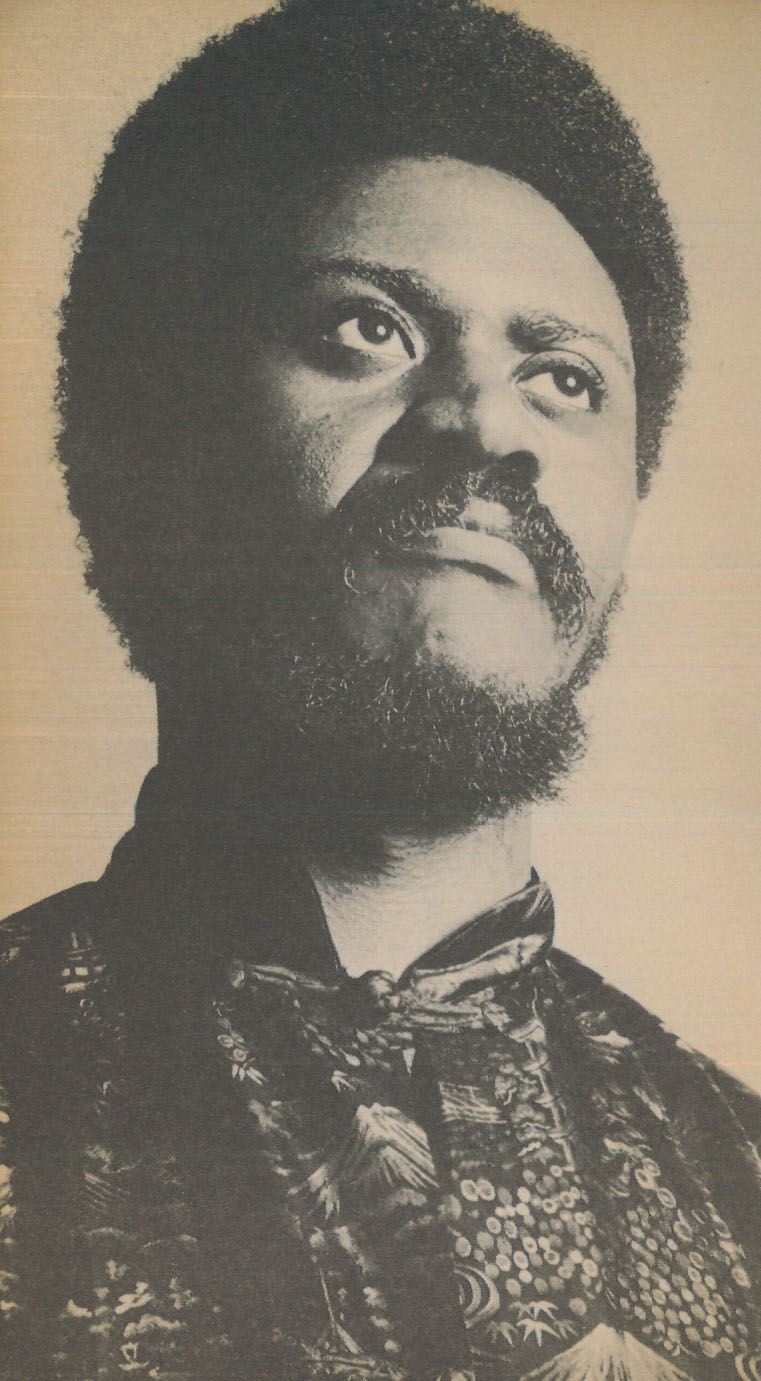
PHARAOH SANDERS
HOMETOWN: Little Rock, Arkansas
MUSIC SPECIALTY: Tenor saxophone
BIGGEST HITS: Tauhid, Karma, Jewels of Thought
ALL about Pharaoh . . .
Pharaoh Sanders, the youngest of three children, showed a great talent for
drawing at a very early age. By the time he reached fifth grade he was doing
much of the artwork for his school.
Music for Pharaoh started with the recorder in junior high. Throughout school
he tried the tuba, baritone horn, drums, clarinet and flute. Then in 1959, he
studied the tenor saxophone-which eventually became his favorite instrument.
His high level of musicianship soon led to the position of assistant band
director at his high school. Afterward. Pharaoh attended Oakland Junior
College, majoring in art while working rock 'n' roll jobs. He played by ear
but was also taking private lessons.
In San Francisco, he met John Coltrane, and a very deep friendship developed.
Pharaoh never officially became a member of Coltrane's group, but he played
with them at the Half Note in New York. He and John always had a wordless
communication through music.
Today Pharaoh's group with Lonnie Liston Smith (piano), Cecil McBee (bass)
and Clifford Jarvis (percussion) is forming a new and exciting sound, one
you've never quite heard before-but will!
RICHARD PRYOR
HOMETOWN: Peoria, Illinois
ADDRESS: Warner Bros. Records Inc., 4000 Warner Blvd., Burbank, California
91505
SPECIALTY: Comedian
ALL about Richard . . .
At times he seems moody and at times high on life, sometimes controversial,
but always Richard Pryor is a funny man.
The climb to success has not been easy. Richard started his career sitting
behind the set of a Peoria nightclub at the age of seven. His first stage
appearance was in a community center production of Rumplestiltskin at twelve.
In his senior high school class he was unanimously awarded the title of
"the Class Bad Guy" for his puns and practical jokes.
The hard times seemed to be many for Richard. During school he had to work at
many jobs, from packaging beer to delivering coal to racking billiard balls
at his grandfather's parlor. Afterwards he spent fourteen months in the Army.
Honorably discharged, he wandered about the country living on odd jobs,
scrubbing floors and washing dishes. He worked as a master of ceremonies in a
couple of clubs in Canada and then split for New York.
Richard arrived in the big city with $1.50 to his name. After a shower, a
suit-pressing and the purchase of cigarettes, that was lowered to 33 cents.
Walking all the way from Upper Manhattan to Greenwich Village, he auditioned
for a job as comedian at a place called the Cafe Wha!?. He played there for a
year. One night a friend of Richard's informed him that an agent was going to
be at another club. So Richard finished his regular job and rushed over to
the Bitter End for a guest performance.
The agent was so enthused that he forgot the artist he had come to hear and
signed Richard on the spot. Richard's 1965 appearance on The Ed Sullivan Show
launched his television career, and the rest is history. Today he is even
looking into record production for his future.
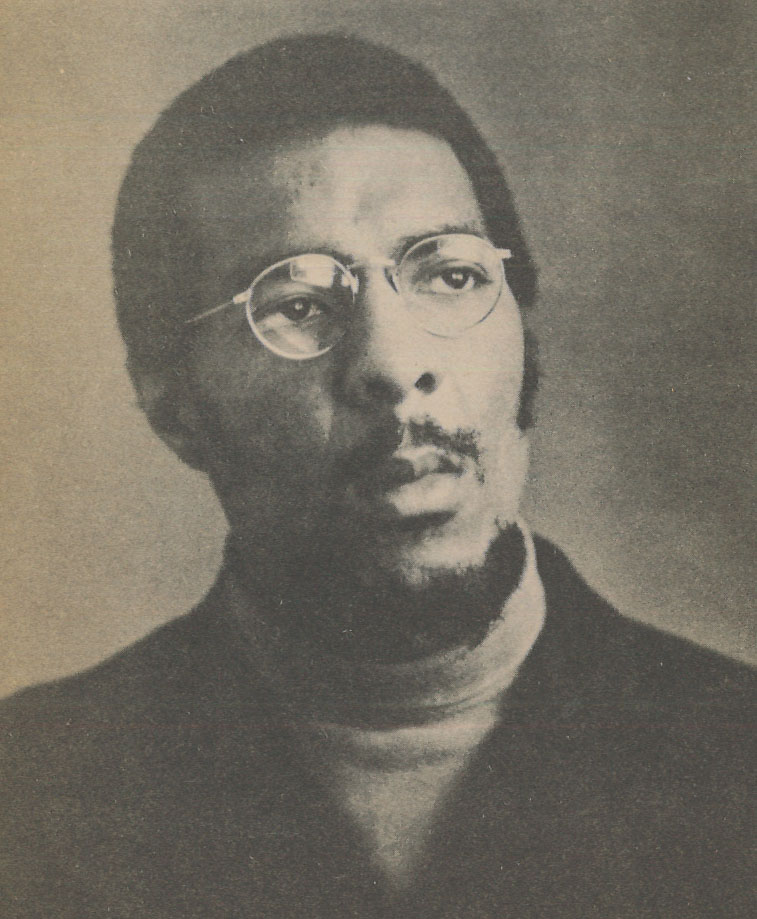
RICHIE HAVENS
HOMETOWN: Bedford-Stuyvesant, Brooklyn
MUSIC SPECIALTY: Folk/blues singer
BIGGEST HITS: "Here Comes The Sun," "High Flyin' Bird"
ALL about Richie . . .
"When I sing," thirty-one-year-old Richie Havens says, "my
mind is busy looking at the pictures the writer created. My body has
something to do, which is to play the guitar. And my spirit is feeling the
song's sensations all over again. It's like this: I sing from what I see. It
goes out and then it comes back to me."
The oldest of nine children, Richie grew up in one of New York's roughest
ghettos. His father was a pianist who earned his living as an electroplater.
His mother, to help support her large family, worked in a bookbinding
factory. For young Richie, "play" was singing on street corners
with other neighborhood kids. By the time he was fourteen, he'd organized a
group called the McCrea Gospel Singers, but "only for fun. At that time
I really thought I'd be a surgeon!" Richie recalls.
At seventeen he left home for good. "See, my mother was groovy. She made
me move around, let me find out about things. So when I left, it was just
that I had to find out what it was like to be somewhere else."
Somewhere else turned into a weird assortment of jobs, including: Western
Union messenger, counterman for a chain of restaurants, yarn winder and doll
factory worker.
"I loved it!" Richie says today. "I found out how to do a lot
of things. I met all sorts of people. I think with each thing a man learns
how to do, he gets closer to knowing something about himself."
To find out even more, Richie moved to Greenwich Village where he supported
himself by doing portraits of tourists in the daytime and, at night, chatting
with friends in Village coffee houses.
1962 found Richie in the middle of the height of the folk music revival.
"It was at the Gaslight and the Cafe Wha," he recalls, "I
began hearing Len Chandler and Dino Valenti and Paul Stookey. They inspired
me to try singing."
In the following years, Richie sang his way from coffee house to coffee
house, touring with Nina Simone, Herbie Mann and Mongo Santamaria. In the
fall of 1966, Verve-Folkways released his now-legendary Mixed Bag album, and
from there on out (including his much-hailed performance in the film
Woodstock), Richie entered a special world of truly significant performers.
And there aren't many of them either!
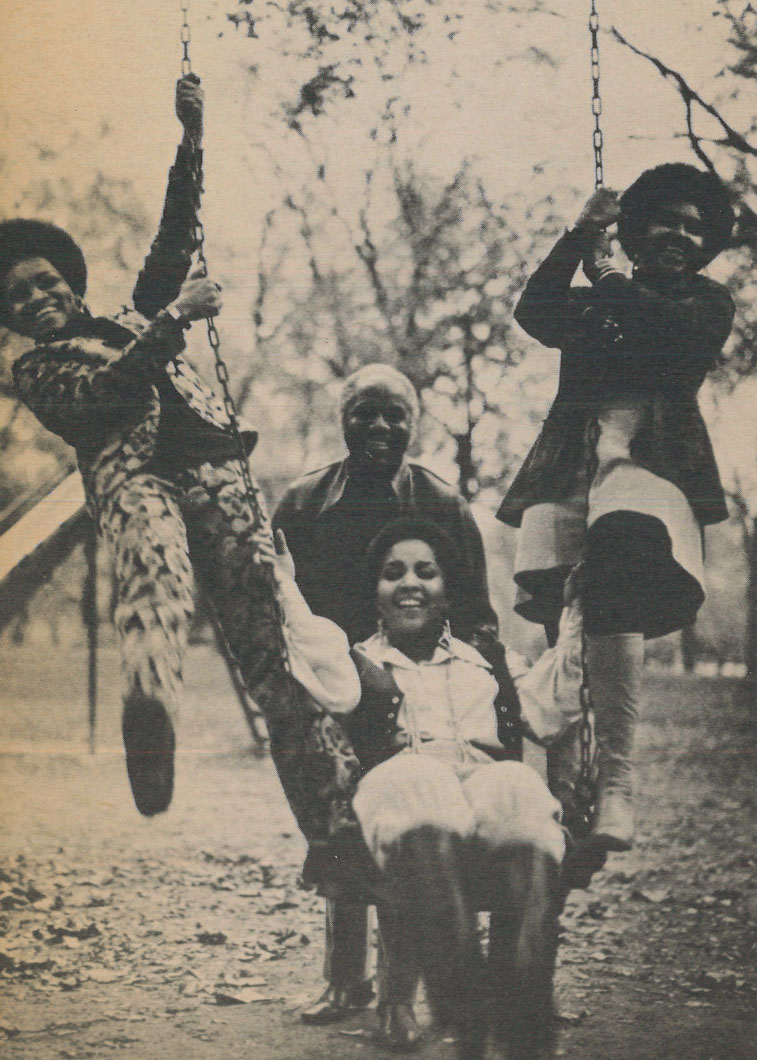
STAPLE SINGERS
HOMETOWN: Drew, Mississippi
MUSIC SPECIALTY: Vocal group -- four members
BIGGEST HIT: "Respect Yourself"
ALL about the Staples . . .
The Staple Singers (Roebuck "Pop" Staples and his daughters Mavis,
Cleo and Yvonne) sing a variation of gospel which reaches across all
barriers, social, racial and language.
In 1935, the Staple family moved from Mississippi to Chicago, Illinois, where
they began performing at local homes and churches. From there, they've taken
their gospel message around the world. The Staple Singers have received
honors for their outstanding contributions to humanity in the field of music
and have performed before the President of the United States.
The Singers' message is PEACE, and some of their lyrics are written by
"Pop" Staples himself! They feel that even though they appear
before audiences who don't know the language, their feeling comes through
loud and clear.
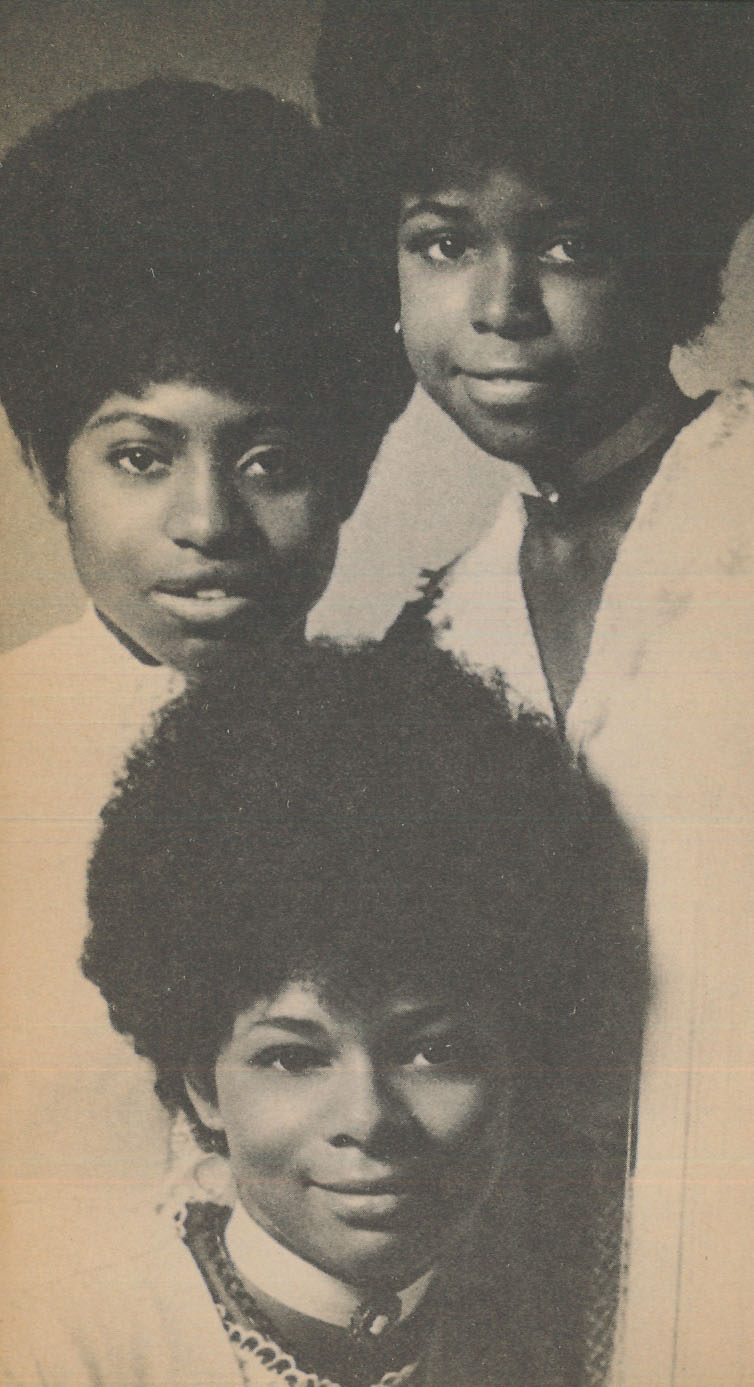
SUNDAY'S CHILD
HOMETOWN: Portland, Oregon
MUSIC SPECIALTY: Vocal group -- three members
BIGGEST HIT: Sunday's Child
ALL about Sunday's Child . . .
Sunday's Child grabs its audiences with warmth and movement. The
professionalism of the trio seems unbelievable when you consider their ages.
Sunday's Child consists of Ilene Anderson, seventeen, a towering 6'2"
beauty; Ilene's sister, Mary Lou, fourteen, the choreographer of the group,
and Renee Woods, fourteen, their cousin who is a fantastic natural performer.
It was only four years ago that the three girls were entertaining themselves
and their friends in Portland, Oregon, as the Three Little Souls. Ilene and
Mary Lou's older brother Ted took one of their recordings to Larry Raphael, who
had been looking for top new acts. He listened and signed them, renaming them
Sunday's Child. Soon after they were booked on NBC's Soul Special. Since
then, they have appeared on television, in Las Vegas, at Carnegie Hall, and
it seems that there is no stopping their enthusiasm, energy and amazing
ability.
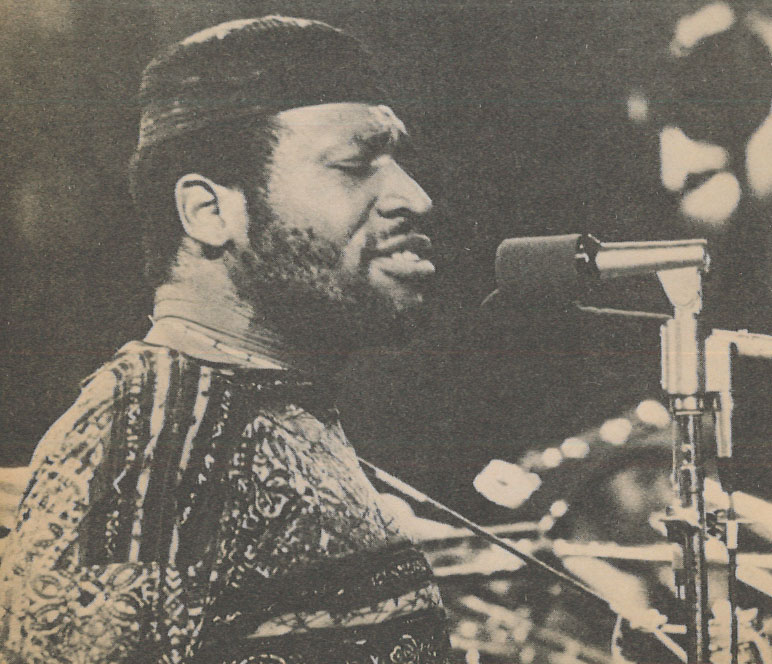
TAJ MAHAL
HOMETOWNS: Taj: Boston, Massachusetts; John: Norwalk, Connecticut; Hoshal:
Omaha, Nebraska; Bill: Omaha, Nebraska; James: Nashville, Tennessee; Rocki:
Ghana, Africa; Howard: Montgomery, Alabama; Bob: New York, New York; Joseph:
New York, New York; Earl: New York, New York.
MUSIC SPECIALTY: Instrumental group -- ten members
BIGGEST HITS: The Real Thing, Happy To Be Just Like I Am
ALL about Taj . . .
Taj Mahal started alone, grew to a group of four and then expanded to a
"family" of ten musicians who are extremely happy and extremely
talented.
Taj himself is a very proud and unique talent. His father was a noted jazz
pianist and arranger. Teaching himself to play piano, harmonica, bass, vibes,
mandolin and dulcimer, Taj has changed his musical style several times but
never his roots. Now, with nine of the best musicians around. Taj Mahal is a
group that gets deep into your soul. John Simon (piano) learned from his
father and even though his training is in classical music he is influenced by
"everyone." John is also a fine composer in his own right.
Hoshal Wright (guitar) has been playing his instrument for half his life and
is mostly into jazz. However, Hoshal feels that Taj's band gives him a
tremendous opportunity for growth and experimentation.
Bill Rich (Fender bass) has been playing for a decade and, before joining the
band, worked with Buddy Miles for two years.
James Charles Otey, Jr., (drums) is known as Jimmy to his friends. Even
though he was once a band leader himself, he feels that he has more freedom
with Taj because the feeling of family makes him happy and he can transfer
that feeling to his audience.
Kwasi (Rocki) Dzidzornu (conga, African talking drum, African percussion
instruments) comes from the Ewe tribe on the West Coast of Africa where his
father was the chief drummer. Rocki moved to London
where he has played with such greats as the Rolling Stones, Jimi Hendrix,
Traffic and Steve Stills. He, as all the other members, is completely taken
with the warmth generated within the group.
Howard Johnson (F & B-flat tuba, flugelhorn, baritone sax) is a jazz
great in his own right and sums up Taj Mahal with, "When you put a band
together. I think it should be in terms of hiring people, not instruments,
and that's true of this band."
Bob Stewart (C tuba, trumpet, flugelhorn) began with the trumpet but changed
to tuba at the Philadelphia Music Academy. Since then, Bob has taught school
in Philadelphia and in Harlem. He misses his students very much but feels he
made the right decision in joining Taj. Joseph Daley (tuba and valve
trombone) has been playing tuba for over six years and once played with Lloyd
Price and with Mongo Santamaria's son, Monquito, Joseph feels that Taj gives
him a chance "to really stretch out with my music."
Earl Mcintyre (E-flat tuba, bass trombone) is the youngest member and has
graduated from the Music and Art School in New York. Taj is the first major
group he's played with.
And there you have the ten pieces of Taj Mahal that fit together perfectly!
WANDA ROBINSON
HOMETOWN: Baltimore, Maryland
MUSIC SPECIALTY: Poetry
BIGGEST HIT: Black Ivory
ALL about Wanda . . .
Wanda Robinson is a loner who refuses to view life through rose-colored
glasses.
Born November 18, 1949, in Baltimore, Wanda was raised by her grandmother.
Unlike her six sisters and brothers, Wanda enclosed herself in a world of
books, music and poetry. The result turned out to be something of a
surprise-primarily for Wanda. Instead of isolating her, music and poetry
turned into a hotline to the world outside. All the things Wanda couldn't
reveal through conversation came out in her poetry. Black Ivory, her first
album, is a beautiful and often haunting example of this.
After studying three years at Baltimore's Community College, Wanda began to
feel the force behind her own need to communicate to those around her. Her
poetry (often upsetting) reflects both her sensitivity toward others and her
anger at all those who refuse to feel. In addition to her album (there's
another in the works now}, Wanda is preparing a book of all her poems (400 in
all). After that? At twenty-one, Wanda admits her next goal is "to have a
farm. Not the kind with chickens or cows, but a house with lots of land to
relax and write stories for children."